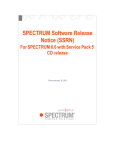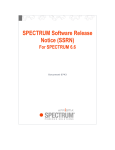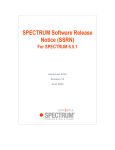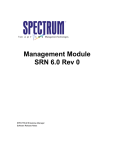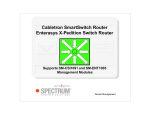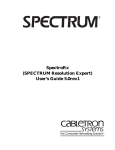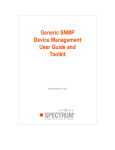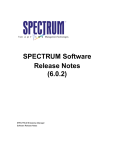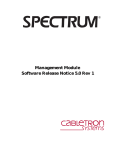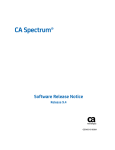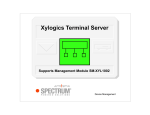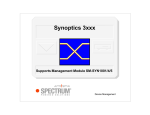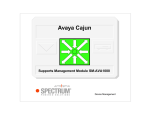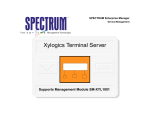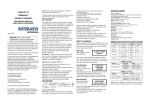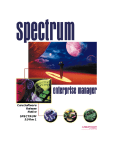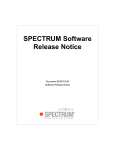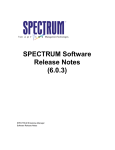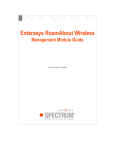Download Enterasys 9A686-04 Specifications
Transcript
SPECTRUM Software Release Notice (SSRN) For SPECTRUM 6.6 with Service Pack 2 CD release Document 5135 Notice Copyright Notice Copyright © 2002-present by Aprisma Management Technologies, Inc. All rights reserved worldwide. Use, duplication, or disclosure by the United States government is subject to the restrictions set forth in DFARS 252.227-7013(c)(1)(ii) and FAR 52.227-19. Liability Disclaimer Aprisma Management Technologies, Inc. (“Aprisma”) reserves the right to make changes in specifications and other information contained in this document without prior notice. In all cases, the reader should contact Aprisma to inquire if any changes have been made. The hardware, firmware, or software described in this manual is subject to change without notice. IN NO EVENT SHALL APRISMA, ITS EMPLOYEES, OFFICERS, DIRECTORS, AGENTS, OR AFFILIATES BE LIABLE FOR ANY INCIDENTAL, INDIRECT, SPECIAL, OR CONSEQUENTIAL DAMAGES WHATSOEVER (INCLUDING BUT NOT LIMITED TO LOST PROFITS) ARISING OUT OF OR RELATED TO THIS MANUAL OR THE INFORMATION CONTAINED IN IT, EVEN IF APRISMA HAS BEEN ADVISED OF, HAS KNOWN, OR SHOULD HAVE KNOWN, THE POSSIBILITY OF SUCH DAMAGES. Trademark, Service Mark, and Logo Information SPECTRUM, IMT, and the SPECTRUM IMT/VNM logo are registered trademarks of Aprisma Management Technologies, Inc., or its affiliates. APRISMA, APRISMA MANAGEMENT TECHNOLOGIES, the APRISMA MANAGEMENT TECHNOLOGIES logo, MANAGE WHAT MATTERS, DCM, VNM, SpectroGRAPH, SpectroSERVER, Inductive Modeling Technology, Device Communications Manager, SPECTRUM Security Manager, and Virtual Network Machine are unregistered trademarks of Aprisma Management Technologies, Inc., or its affiliates. For a complete list of Aprisma trademarks, service marks, and trade names, go to: http://www.aprisma.com/manuals/trademark-list.htm All referenced trademarks, service marks, and trade names identified in this document, whether registered or unregistered, are the intellectual property of their respective owners. No rights are granted by Aprisma Management Technologies, Inc., to use such marks, whether by implication, estoppel, or otherwise. If you have comments or concerns about trademark or copyright references, please send an e-mail to [email protected]; we will do our best to help. Restricted Rights Notice (Applicable to licenses to the United States government only.) This software and/or user documentation is/are provided with RESTRICTED AND LIMITED RIGHTS. Use, duplication, or disclosure by the government is subject to restrictions as set forth in FAR 52.227-14 (June 1987) Alternate III(g)(3) (June 1987), FAR 52.227-19 (June 1987), or DFARS 52.227-7013(c)(1)(ii) (June 1988), and/or in similar or successor clauses in the FAR or DFARS, or in the DOD or NASA FAR Supplement, as applicable. Contractor/manufacturer is Aprisma Management Technologies, Inc. In the event the government seeks to obtain the software pursuant to standard commercial practice, this software agreement, instead of the noted regulatory clauses, shall control the terms of the government's license. Virus Disclaimer Aprisma makes no representations or warranties to the effect that the licensed software is virus-free. Aprisma has tested its software with current virus-checking technologies. However, because no antivirus system is 100-percent effective, we strongly recommend that you write protect the licensed software and verify (with an antivirus system with which you have confidence) that the licensed software, prior to installation, is virus-free. Contact Information Aprisma Management Technologies, Inc., 273 Corporate Drive, Portsmouth, NH 03801 USA Phone: 603.334.2100 U.S. toll-free: 877.468.1448 Web site: http://www.aprisma.com SPECTRUM Software Release Notice (SSRN) For SPECTRUM 6.6 with Service Pack 2 CD release Page 2 Document 5135 Contents Notice ........................................................................................... 2 Overview ...................................................................................... 7 Upgrade Considerations ............................................................... 8 SPECTRUM 6.6 Feature List ........................................................ 10 AutoDiscovery ..........................................................................10 Performance ........................................................................10 Accuracy .............................................................................11 Smart Defaults ....................................................................11 General Usability ..................................................................12 Distributed Install .....................................................................13 Event and Alarm Management ....................................................13 Maintenance Mode ....................................................................14 New Management Modules .........................................................15 Enhanced Management Modules ..................................................16 Non-Persistent Connection Manager (NPC) ...................................18 SNMPv3 ...................................................................................18 SPECTRUM Configuration Manager ..............................................19 Trap Handling ...........................................................................19 Web Operator Suite ...................................................................20 Performance .............................................................................21 Additional Usability Enhancements ..............................................21 Miscellaneous Enhancements ......................................................22 Corrected Issues ........................................................................ 23 ATM Manager ...........................................................................23 AutoDiscovery & Modeling ..........................................................23 CLI .........................................................................................24 Database, Data Export, & Reports ...............................................25 Event & Alarm Management .......................................................26 SPECTRUM Software Release Notice (SSRN) For SPECTRUM 6.6 with Service Pack 2 CD release Page 3 Document 5135 Fault Tolerance .........................................................................27 Installation ..............................................................................28 Location Server ........................................................................28 Miscellaneous ...........................................................................29 Management Modules ................................................................30 Dominion Web Reporter .............................................................32 Search Manager ........................................................................33 Security ...................................................................................33 SpectroGraph ...........................................................................33 SpectroSERVER ........................................................................35 Toolkits ...................................................................................36 Web Operator Suite ...................................................................36 Known Anomalies in SPECTRUM 6.6 Service Pack 2 CD Release . 37 AR System Gateway ..................................................................37 Enterprise Alarm Manager (EAM) .................................................39 Level I Developer’s Toolkit .........................................................40 SpectroGRAPH ..........................................................................40 SpectroSERVER ........................................................................41 SPECTRUM Alarm Notification Manager (SANM) .............................41 SPECTRUM Installation/Uninstallation Programs ............................42 BayStack Ethernet Hubs ............................................................42 Brocade Silkworm Switches ........................................................43 Cabletron SmartSwitch 6000 Family ............................................44 Cabletron SmartSwitch 9000/9500 ..............................................45 Cisco Catalyst ...........................................................................48 Cisco Router .............................................................................50 Empire Agent ...........................................................................51 Enterasys Matrix E5 ..................................................................52 Extreme Devices .......................................................................53 F5 Networks .............................................................................54 ForeRunner Series of ATM Switches .............................................54 Host Compaq Module .................................................................55 SPECTRUM Software Release Notice (SSRN) For SPECTRUM 6.6 with Service Pack 2 CD release Page 4 Document 5135 Juniper Networks ......................................................................56 Packeteer PacketShaper .............................................................57 Nortel Contivity Extranet Switch ..................................................57 Riverstone SmartSwitch Router ...................................................58 SmartSwitch Routers (SSR) ........................................................59 Sun Management Center Agent ...................................................60 SynOptics 5000 Hubs ................................................................61 SynOptics Modules ....................................................................62 Wellfleet Routers ......................................................................63 Multiple Management Modules ....................................................64 Discontinued Products and Components ..................................... 65 About Discontinued Products and Components ..............................65 Device Management Components ................................................66 Cabletron Device Management Components ............................66 Management Modules ................................................................67 Questions & Answers ............................................................67 Feature Comparison .............................................................68 EPI, SSAPI, IHAPI, Simulator Playback Tool ..................................71 Questions & Answers ............................................................71 Feature Comparison .............................................................73 SpectroRX ................................................................................74 Questions & Answers ............................................................74 Feature Comparison .............................................................74 Support for Export to SAS, Ingress, Sybase, Oracle, and Microsoft SQL Database Types .................................................75 Questions & Answers ............................................................75 Feature Comparison .............................................................76 Support for NetScape ................................................................77 Questions & Answers ............................................................77 Feature Comparison .............................................................78 Products and Functionality Targeted for Discontinuation in Future Releases ................................................................... 79 SPECTRUM Software Release Notice (SSRN) For SPECTRUM 6.6 with Service Pack 2 CD release Page 5 Document 5135 Device Management ..................................................................79 Device MIB Support ..................................................................79 Note to Users ...........................................................................79 Index .......................................................................................... 80 SPECTRUM Software Release Notice (SSRN) For SPECTRUM 6.6 with Service Pack 2 CD release Page 6 Document 5135 Overview A copy of the SPECTRUM Software Release Notice (SSRN) is included on both the SPECTRUM Application CD Version 6.6 with Service Pack 2 and the SPECTRUM Documentation CD Version 6.6 with Service Pack 2; it is also available online at http://www.aprisma.com/manuals. The SSRN is intended to alert users to special considerations for upgrades, product enhancements or changes, late-breaking information, and corrected and known anomalies. It is strongly recommended that you read the SSRN so you are aware of any changes in the product or the associated documentation. SPECTRUM Software Release Notice (SSRN) For SPECTRUM 6.6 with Service Pack 2 CD release Page 7 Document 5135 Upgrade Considerations This section identifies product changes that should be considered when upgrading from prior releases. Some of these changes may require modifications to existing SPECTRUM customizations and integrations. • The version of Service Performance Manager (Web Operator component) in this release is not compatible with SpectroSERVERs at a version prior to 6.6.0 SP1. In order to use this version of SPM (Web Operator component) across a set of distributed SpectroSERVERs, all SpectroSERVERs must first have at least 6.6 SP1 applied. • Warning message(s) may occur in the install log. These warnings do not imply a problem and can be ignored. For example: "Warning: Attribute 0x114e2 does not appear to be a valid attribute for modeltype 0xXXXXXXX. Default value not set." • Alarm Notifier will only pass the most recent event for an alarm update if the new SHOW_ALL_EVENTS .alarmrc parameter is set to FALSE. By default, this new parameter is set to FALSE, thereby changing the outof-box behavior of Alarm Notifier. For Alarm Notifier integrations that depend on the prior default behavior of all associated events being passed with alarm updates, SHOW_ALL_EVENTS should be set to TRUE in the .alarmrc. • CLI output change - CLI "show attributes" output for multiple attributes are now reported in the same order as they were requested. This restores the behavior that existed prior to the 6.5.1 release. (*** This may require certain CLI scripts to be adapted to support this output change.) • AutoDiscovery behavior change - When you run a container based discovery (with Map Topology unchecked), AutoDiscovery now attempts to move all models (both new and pre-existing) that correspond to entries in the result set into the chosen container. Previously, a container-based discovery (with Map Topology unchecked) would only put new models in the container. The current work-around is to set the IsMovable attribute to FALSE for all existing device models before performing any container-based discoveries. To do this using Search Manager (for device models selected from search results), select Management > Set Attribute Values and set Topologically Relocate Models to False. SPECTRUM Software Release Notice (SSRN) For SPECTRUM 6.6 with Service Pack 2 CD release Page 8 Document 5135 • The AutoDiscovery application database, which stores configurations and result sets, has been re-implemented. The first time Auto Discovery is run after installing any Service Pack on SPECTRUM 6.6, the pre-existing database will be automatically converted to the new implementation, preserving any pre-existing data. As an added precaution, the installation will copy the entire pre-existing SPECROOT/ AutoDiscover directory to SPECROOT/AutoDiscover.backup. Once the new version of Auto Discovery has been run successfully, and access to any pre-existing data has been verified, the SPECROOT/ AutoDiscover.backup directory can be safely removed. • The JMibTools application database, which stores compiled SNMP MIB information, has been re-implemented. The first time JMibTools is run after installing SP2 on SPECTRUM 6.6, the pre-existing database will be automatically converted to the new implementation format, preserving any previously imported MIB data. This process will cause a noticeable delay the first time JMibTools is run. Subsequent runs will not suffer from this one-time database conversion delay. • A number of Attributes in the Cisco_IP_MIB Model Type were recreated with the correct data type (IP Address) to avoid a potential SpectroSERVER crash when attempting to log these attributes through SpectroWATCH. Any customer created SpectroWATCHes, GIB views, or other customizations or extensions involving the old attributes must be changed to use the new attribute IDs. Here is the complete list of old/ new attribute IDs. Attribute Name Old ID New ID -------------- --------- --------- actSrc 0x210120 0x211252 actDst 0x210121 0x211253 ckactSrc 0x210127 0x211254 ckactDst 0x210128 0x211255 locIPHelper 0x210112 0x211256 locIPWho 0x210111 0x211257 locRtMask 0x210118 0x211258 SPECTRUM Software Release Notice (SSRN) For SPECTRUM 6.6 with Service Pack 2 CD release Page 9 Document 5135 SPECTRUM 6.6 Feature List This section describes new features included in SPECTRUM Version 6.6. Additional enhancements are included in this Service Pack 2 CD release. Those additional enhancements are discussed in the respective Software Release Notes for the Web downloadable versions of 6.6 Service Packs 1 and 2, which can be accessed at: http:// www.aprisma.com/support/secure/download/ index.cgi?rev=06.06.00 AutoDiscovery One of the many goals for SPECTRUM 6.6 was to improve AutoDiscovery in the areas of performance, accuracy, and overall usability. Below is a list of all the significant changes that have been made and a brief description of their impact. Performance • Enhanced error checking: Often device firmware errors cause blank lines to appear in some SNMP tables. Code has been inserted into AutoDiscovery to handle these anomalies. • Router Discovery Enhancements: The IP router discovery algorithm has been rewritten to improve table read efficiencies. This new functionality should be most noticeable on routers with large SNMP tables. These increased efficiencies will also decrease the load associated with SNMP discovery on the router. • Enhanced use of proprietary discovery protocols: Several enhancements were made to AutoDiscovery to ensure complete usage of proprietary discovery protocols (CDP, EDP, SDP). • Model Activation: Changes were made to decrease model activation time at discovery or server restart. • Lightweight VLAN model: Changes were made to the VLAN port model type to make it more efficient and decrease the amount of system resources it requires. The end result is faster model activation time and better overall SPECTRUM performance. SPECTRUM Software Release Notice (SSRN) For SPECTRUM 6.6 with Service Pack 2 CD release Page 10 Document 5135 • Reduction in Model Count and Memory Usage: Model count and memory usage were reduced by no longer automatically discovering/ modeling unnecessary EthernetIfApp application models. These may still be generated, if needed, by initiating a manual application rediscovery from a device’s configuration view. Accuracy • Fanout models: Additional intelligence has been added to review fanout placement. Previous releases of SPECTRUM would place a fanout between devices when the connecting device was unmanaged. When the connecting device was subsequently managed, the fanout would remain. The new intelligence will look for this condition and remove the fanout. • Multi-link Technology: Enhancements were made to ensure more accurate device connectivity for multi-link technologies (Smarttrunk, Etherchannel, 802.3AD). • Spanning tree: Enhancements were made to the spanning tree discovery algorithms to ensure more accurate connectivity mapping. • End station mapping: Additional intelligence was added to assist in mapping end station connectivity. • Layer 3 Discovery: Changes were made to the layer 3 discovery options to eliminate any layer two discovery dependencies. Smart Defaults • Auto placement: Changes have been made to the auto place models functionality to make the results more usable. A common task associated with the old auto place functionality was to edit the results to move the models closer together for better screen usage. New with 6.6, the auto place option will place models closer together to ensure better use of screen real estate. The default setting in the AutoDiscovery GUI will remain none, but if the user selects radial, their results will be closer together. • Zoom-to-fit: Enhancements have been made to the zoom-to-fit feature to ensure complete screen usage regardless of screen resizing. • ATM Discovery: An additional setting will be presented to the user to allow them to enable ATM discovery. By default, ATM discovery will be disabled. SPECTRUM Software Release Notice (SSRN) For SPECTRUM 6.6 with Service Pack 2 CD release Page 11 Document 5135 • Universe settings: Changes have been made to the default universe settings to provide a cleaner modeling presentation. New Defaults: 1) Create routers in this view only 2) Place LANs in this view only 3) Create LANs. • Loopback and Duplicate IP support: A change was made in SPECTRUM to allow models to exist that have duplicate IP addresses. Some networking technologies such as load balancers create identical IP addresses across a range of devices. Also, users occasionally configure the same loopback IP address across devices in order to simplify connections for local management. SPECTRUM AutoDiscovery will now be able to discover and model these unique environments. • Live Pipes: The live pipes configuration intelligence was improved to persist the port polling status even if the connection off that port is removed and a new connection is modeled. Therefore, if the previous connection to the port had a live pipe, future connections to that port model will be live. General Usability • Modeling capabilities for Catalyst boards have been enhanced to allow the modeling of multiple boards with the same serial number. • AutoDiscovery will now perform a layer-three mapping of existing device models as well as those that are being newly added by the AutoDiscovery application. • Users will now be able to open and delete multiple AutoDiscovery result sets at once by using their mouse in conjunction with either the “Control” or “Shift” keyboard buttons. • Container-based AutoDiscovery can now populate containers of customer-created model types derived from Network, LAN, and other key container model types. • All modeling information that is displayed during the AutoDiscovery process will now be logged in the AutoDiscovery logs directory. • Users will now have the ability to get an event after a router reconfiguration event completes. This is helpful in initiating postreconfiguration scripts for model updating. In addition, if scripting is used to reconfigure like models in a large environment, this provides the user with visibility into which models failed to be reconfigured. SPECTRUM Software Release Notice (SSRN) For SPECTRUM 6.6 with Service Pack 2 CD release Page 12 Document 5135 • Database check and backup will now occur prior to completing AutoDiscovery. The check provides the user with a warning if their database is corrupt prior to starting AutoDiscovery and allows them to restore a non-corrupt database. The backup then ensures they have a clean backup available moving forward if there is a problem that occurs during the discovery. Distributed Install • Users will now be able to complete distributed, multi-platform remote installations of all core SPECTRUM components and patches via command-line configuration files and utilities from a single host system. Event and Alarm Management • AlarmNotifier was enhanced to provide flexibility in determining the events to be viewed for each alarm. Users can now choose to show all events or view a summary of events where duplicates have been removed. • Error checking and messaging in AlarmNotifier was enhanced to provide better, more meaningful error messages when errors occur within EventFormat files. • Read-only users are now able to acknowledge alarms if the “Alarm Update by Read Only” attribute is set to true on the AlarmMgmt model. • When retrieving alarms using AlarmNotifier, if a DLCI ports goes down, the IP address for the logical DLCI port will now be displayed instead of the primary IP address of the device. • The Clear User Preferences menu pick will now be disabled for ReadOnly users. SPECTRUM Software Release Notice (SSRN) For SPECTRUM 6.6 with Service Pack 2 CD release Page 13 Document 5135 Maintenance Mode • Users can now enable maintenance mode for individual interfaces/ports of a device. Interfaces/ports in maintenance mode behave in the same manner as devices in maintenance mode. No alarms or events will be asserted on the interface/port while in maintenance mode. SPECTRUM will send no SNMP or ICMP communications to the interface/ports while in maintenance mode. Additionally, loss of contact alarms will be suppressed for devices, WA_Links, or fanouts connected to a port in maintenance mode. If a link down trap comes in for a port in maintenance mode, no alarm will be asserted on the device or the port model. • Predefined searches have been added to the SPECTRUM Search Manager to allow users to rapidly find all interfaces/ports currently in maintenance mode. • The image/icon presented when a dialup link is in maintenance mode has been refined to more clearly show that its status is maintenance rather than in use. • The WA_Link display has been enhanced so that the color displayed is brown if the WA_Link is placed in maintenance mode. The color is green if a device attached to the WA_Link is placed in maintenance mode. • When a device is placed in Maintenance Mode, the pipes associated with the device will now go brown as well. • If SPECTRUM loses contact with devices downstream from a port or device in maintenance mode, the lost models will now be reflected in the Impact Severity and Impact Scope of the maintenance mode alarm. Therefore, when a device or port is put in maintenance mode, a brown alarm is immediately created for that model. The Impact Severity of that alarm will be zero. If the server later loses contact with the two devices downstream from the brown device or port, the two device models will go gray. In addition, the Device Criticality of those two device models will be added to the Impact Severity of the brown (maintenance alarm), and the Impact Scope view of the brown alarm will show the two lost device models. When SPECTRUM regains contact with the downstream devices, they will be removed from the alarm impact. SPECTRUM Software Release Notice (SSRN) For SPECTRUM 6.6 with Service Pack 2 CD release Page 14 Document 5135 New Management Modules • Nortel Contivity MM: This MM delivers support for Nortel’s Contivity family of VPN switches and provides IP Fault Management visibility. The MM provides support for many RFCs including, but not limited to RFC2737 (Entity MIB), RFC2787 (VRRP MIB), RFC2790 (Host Resources MIB), RFC1850 (OSPF MIB), and RFC1724 (RIP2 MIB). Given the VPN focus of this family of devices, of particular interest is RFC2667 (IP Tunnel MIB). The IP Tunnel MIB contains two main tables of information which will be supported by SPECTRUM. The first view will be a Tunnel Interface View and will display information from RFC2667's “tunnelIfTable” MIB group. This table contains information about configured tunnels. Examples of information that is available for each tunnel include, Local and Remote IP address of the tunnel, the encapsulation method the tunnel uses (e.g. L2TP, GRE, PPTP) and security used. The second view will be a Tunnel Configuration View and will display information from RFC2667's “tunnelConfigTable” MIB group. This MIB group contains much of the same information found in the previously described group (Local and Remote IP, encapsulation method, security, etc.), but also, most importantly, the status of the tunnel. Additionally, approximately 50 vendor-specific SNMP traps as well as other traps from the aforementioned RFCs will be supported; the trap information will be available to users as SPECTRUM events and alarms. Finally, the management module will support the integration of the Contivity Web Interface. • Cisco 3000 Series MM: This MM delivers support for Cisco’s 3000 family of VPN switches (including 3005, 3015, 3030, 3060, 3080) and provides IP Fault Management visibility. The MM provides support for many RFCs including, but not limited to RFC1850 (OSPF MIB) and RFC1724 (RIP2 MIB). Given the VPN focus of this family of devices, of particular interest is support for Cisco’s IPSEC-FLOW-MONITOR MIB. In addition, RFC2667 (IP Tunnel MIB) is also very important. There are approximately 6 groups of IPSEC Tunnel information contained in this MIB, from which a targeted set will be used by SPECTRUM and exposed for the user for the purpose of IP Fault Management. These include views for Internet Key Exchange (IKE) Global Statistics as well as IPSec Global Statistics. Additionally approximately 10 vendor-specific SNMP traps as well as others from the aforementioned RFCs mentioned will be supported. Examples of information that are contained in the traps include Tunnel Start/Stop activity, Tunnel Failure, and Early Termination failures. These will be exposed to the user via SPECTRUM events and alarms. SPECTRUM Software Release Notice (SSRN) For SPECTRUM 6.6 with Service Pack 2 CD release Page 15 Document 5135 • Cisco CallManager MM: This MM delivers support for Cisco’s CallManager. The MM provides support for the Cisco CallManager (CCM) MIB. Supported MIB groups include the “ccmTable” (CallManager) MIB group, “ccmGatewayTable” group and the “ccmGatewayTrunkTable” group. These tables provide the user insight into the health of the CallManager as well as information on the gateway connected to the CallManager. CallManager specific traps will be supported and will be available to the user as SPECTRUM event and alarms. Lastly, this management module will support the integration of the web-based CCM Administration suite. • Enterasys RoamAbout 2 MM: This MM delivers support for Enterasys’ RoamAbout R2 family Wireless Access Platform LAN switch and provides IP Fault Management visibility. Supported MIB groups include IEEE 802.11 and 802.1x Wireless LAN standards including associated trap support. Insight into proprietary MIB information was also provided with a suite of Wireless Status views and Hardware Status views. Access to the device’s web management capabilities is provided through a launch point from the device icon. Additionally, this MM can manage the RoamAbout R2 when configured in SNMPv3 mode with SPECTRUM’s optional SNMPv3 add-on. Enhanced Management Modules The following IETF RFCs are now supported in this release • RFC1724 (RIPv2): Information from this RFC “Global Counters” – which shows the number of route changes and queries, “IF Status” – RIP statistics per interface, “IF Configuration” – RIP2 configuration setting per interface, “Peer Table” – provides information about active peer relationships intended to assist in debugging. • RFC2737 (Entity MIB): This RFC provides information relating to components of a device (i.e. physical interfaces, boards, fans, etc.). SPECTRUM will use this information to provide physical and logical component descriptions, their respective relationships, and their statuses. Additionally, trap support that notifies SPECTRUM of the device’s physical and logical component changes has been added. • RFC2618 (Radius Authentication Client) and RFC2620 (Radius Account Client): These RFCs expose information relating to centralized user password authentication services and the centralized user password account information for the authentication services which are frequently deployed in various VPN and Wireless networks. SPECTRUM Software Release Notice (SSRN) For SPECTRUM 6.6 with Service Pack 2 CD release Page 16 Document 5135 • RFC2667 (IP Tunnel MIB): This RFC provides information pertaining to tunnel protocols that are established over IP. It also provides the public IPs that a tunnel is established over. SPECTRUM will use the information provided on the tunnel such as remote and local IPs, type of tunnel and security, and status of the tunnel. In addition, several other enhancements were made to existing management modules. • Support was added to allow customers to monitor backplane utilization on Cisco devices through a new Backplane Utilization view accessible from a menu pick of the CATStackApp application model. • The Management Module for Cisco Catalysts running IOS was enhanced to allow this module to resolve all connections by expanding its ability to get VLAN specific bridging information from the list of VLANs found in the CISCO-VTP-MIB. • Catalyst device labels were updated to represent the specific Device Type that the user is modeling. • VLAN interface models of Catalyst devices will now be in the subinterface view of the physical port(s) associated with those interfaces, rather than being in the DevTop view of the device. In addition, a more efficient model type is used to represent these VLAN interfaces. • The Nortel Passport MM was enhanced to ensure SNMP requests are properly received thereby enabling SPECTRUM to properly resolve the devices connections completely. • The Compaq Insight Manager Management Module has been enhanced to support the Compaq Threshold MIB. All objects defined in this MIB are available from the Host Compaq model type. Additionally, two new views were added: Threshold Alarms Information and Threshold Agent Information. The Threshold Alarms Information view provides insight into Compaq’s threshold management, including Poll Frequency as well as an Alarm Table containing extensive alarm detail. The Threshold Agent Information view provides insight into agent polling settings, major and minor MIB revision settings, and an Agent Table populated with Name, Version Date, and Purpose. SPECTRUM Software Release Notice (SSRN) For SPECTRUM 6.6 with Service Pack 2 CD release Page 17 Document 5135 Non-Persistent Connection Manager (NPC) • Support for Multilink PPP has been added by allowing a Dialup_Link model to be pasted on more than one interface on a single device model. When the Dialup_Link model is pasted on each of the PPP interfaces which make up the multilink, these interfaces will form a secondary group. A new Dialup_Link model attribute, DevSecGrpActiveCriteria, controls the method used to determine the state of a secondary group, and thus the secondary link. This attribute can be set from the Dialup_Link 'Information' GIB view to the following values: “Any Secondary IF Active” - If any member of the secondary group is active, then the multilink is active; “All Secondary IFs Active” If all members of the secondary group are active, then the multilink is active. • Support for Dialer Profile configurations has been added by allowing Dialup_Link models to be pasted on the Dialer interfaces. These logical interfaces represent a call to or from a particular peer. At call time, a Dialer interface will dynamically bind to a physical interface which is selected from a Dialer pool. Specialized intelligence was implemented to infer the operational state of Dialer interfaces from its ifAdmin/ifOper values as well as the state of any physical interfaces it may be bound to. SNMPv3 • The ability for users to manage SNMPv3 devices with SPECTRUM, including SNMPv3 GET and SET requests, and Traps and Informs, is now available. Users will have the full range of SNMPv3’s authentication and encryption capabilities available to support fully secured management traffic. A new “Model-by-IP” dialog allows the user to select whether a new device should be managed through SNMPv3, and if so, provides the user with options to choose the authentication/ encryption level and provide the relevant security parameters. Note that SPECTRUM AutoDiscovery does not support automated discovery and modeling of SNMPv3 devices. SPECTRUM Software Release Notice (SSRN) For SPECTRUM 6.6 with Service Pack 2 CD release Page 18 Document 5135 SPECTRUM Configuration Manager • SPECTRUM Configuration Manager “save as” capabilities have been enhanced to allow the current configuration to be written to a file with the name devicename_config name.txt. This translates to easier archival of configurations. • The risk of a customer router staying in an infinite “wait” state and SPECTRUM Configuration Manager hanging has been removed. By leveraging a timer to give the device time to respond, reducing the server load, and adding a counter for “wait” messages, the load will automatically be stopped when necessary and the error “Router did not initiate tftp transfer in time” will be presented to the user. • The performance of SPECTRUM Configuration Manager has been enhanced when displaying large amounts of data from Host Configs comparisons. Trap Handling • For unmanaged and unmapped traps, the user will now have access to all trap information. When a trap is received by SPECTRUM for which there is no trap mapping or the element is not modeled in the SPECTRUM object database, all varbind data will be captured and presented to the user in a SPECTRUM event associated with the trap. • Customers who add SNMP trap mappings through AlertMaps can use a new global scope alert mapping by creating a new subdirectory in the CsVendor area and placing an AlertMap file there. Previously, AlertMap trap mapping entries were required for every model type that needed to support the trap. Now only one “global scope” AlertMap entry is required for a trap to be supported/mapped across all modeled devices. These files will be preserved on upgrades. • The trap mapping functionality is no longer available in the Event Configuration Editor. However, it is still possible to map traps by directly editing the appropriate AlertMap file. Instructions for doing this can be found in the Event Configuration Files Guide (5070). SPECTRUM Software Release Notice (SSRN) For SPECTRUM 6.6 with Service Pack 2 CD release Page 19 Document 5135 Web Operator Suite • The amount of unused screen real estate and secondary graphics and logos has been reduced to increase the amount of useful data that can be presented on a screen. This reduces the amount of scrolling and the need for the user to “hunt” for data. • The Web Operator Suite home page has been removed and users will now be initially presented with the Alarm Manager after logging into the product. • Alarm Manager no longer refreshes automatically by default. Users can choose when to refresh or they can activate the automatic refresh. • Alarm severity is now indicated in the alarm table by the background color of the alarm’s table row. Critical alarms are red, major alarms are orange, and minor alarms are yellow. • When using the filter in Web Alarm Manager on a larger number of alarms (>3000), filtered alarms will now be displayed at the top of the list just as they are in Spectrum Alarm Manager. • The Alarm Manager’s alarm table now includes a single details column that presents the user with all of the needed “click areas”. From here users can choose to click to the alarm details, model information, alarm type information, as well as the secondary alarms. • Alarm Impact Severity has been added to the main alarm table, and the Impact Scope View, formerly only available in the desktop Alarm Manager, is now available by clicking on the Impact Severity column. • Alarm type data, including alarm name, probable cause, symptoms and recommendations, is now presented on the alarm details page. Users will no longer need to drill into another Web Operator Suite screen. • User administration has been removed from the Web Operator and is now part of the standard Spectrum User Editor - Spectrum user administration no longer takes place from multiple areas of the system. • Checking and messaging during install has been modified to ensure the user is notified if they try to install Web Operator to a directory with a space in the name. They will be prompted to select a different directory if they try to do this. • Page context-sensitive launch capabilities have been added to allow users to launch into a web-based, searchable version of the SPECTRUM Web Operator User Guide (5078). SPECTRUM Software Release Notice (SSRN) For SPECTRUM 6.6 with Service Pack 2 CD release Page 20 Document 5135 • If BMC PatrolView Integration is in place, visibility of parameters below applications has been enhanced by creating another link below the Application Class that displays a view for all the parameters of each class. Performance • Watch Editor performance has been increased by only displaying a subset of affected models, therefore minimizing the time users wait to retrieve their requested list of models. The number of models to display at any given time will be user-definable. The user will be able to “page” to the remaining undisplayed models at their convenience. • Search Manager Performance for large searches has been enhanced by refining underlying search infrastructure. • The amount of traffic generated by WA_Link models has been decreased to decrease SpectroServer CPU utilization. • Adjustments have been made to increase performance while using “use the same View” preference with a large number of pipes in the view. Additional Usability Enhancements • For Frame Relay management, users are now able to view IfIndex, IfDescription and IP address within the DLCI_Port Configuration GIB view. • Column headers in Global Attribute Editor were updated to better describe the purpose of the data that falls in the “default” column. • Results provided from “Ping through Server” are now provided using the IP address argument instead of the model name, thus providing cleaner/clearer output. • Usability of “Ping through Server” has been enhanced by implementing shorter time outs and providing “Request timed out” messages to end user. • The VLAN List menu pick is now enabled and selectable in the Universe View when the user has a device modeled in the Universe View that has VLANs configured. SPECTRUM Software Release Notice (SSRN) For SPECTRUM 6.6 with Service Pack 2 CD release Page 21 Document 5135 • The “Bring to Front” and “Send to Back” changes made via the Edit mode in the SpectroGRAPH are now saved to the GIB for the current view so that a restart of the SpectroGRAPH displays the desired change. • Automatic map entry timeouts have been added to allow distributed SPECTRUM component entries to age out. This benefits the performance and usability of the server selection start-up dialog of the Control Panel and other distributed applications. This also eliminates manual map update steps that were previously required to eliminate defunct map entries as customer’s distributed SPECTRUM deployments changed over time. • SPECTRUM Southbound Gateway EventAdmin models may now be placed into Container models to alleviate clutter in the Universe view. • Event Configuration Editor now supports configuring the clearing of multiple alarms with a single event code. • MIB2 Link UP/DOWN traps will now trigger an update to link status associated with WA_Link models only so that the user doesn't have to wait for an alarm to know that something has happened. Miscellaneous Enhancements • Multiple telnet sessions can now be run at any one time. • Management Neighbors and live pipes is now documented in the How to Manage Your Network with Spectrum Guide (1909) to better support users ability to set this up correctly and get expected and useful results. • Modeling Gateway can now be used to destroy models that have been completely removed from the network. • The data type of the data_relay_port model type’s ifDescr attribute was changed from Octet String to Text String to allow that attribute value to be human readable when queried through CLI. Also, the MTE was modified to allow for existing attributes to have their data type changed from Octet String to Text String. A utility script was added to the product distribution (in the vnmsh/sample_scripts directory) to allow customers to convert Octet String attribute values returned by CLI to readable text. SPECTRUM Software Release Notice (SSRN) For SPECTRUM 6.6 with Service Pack 2 CD release Page 22 Document 5135 Corrected Issues This section describes issues that have been corrected in SPECTRUM 6.6. Additional corrected issues are included in this Service Pack 2 CD release. Those additional corrected issues are discussed in the respective Software Release Notes for the Web downloadable versions of 6.6 Service Packs 1 and 2, which can be accessed at: http:// www.aprisma.com/support/secure/download/ index.cgi?rev=06.06.00 ATM Manager Corrected Issues: ATM Manager Item Problem Resolution 1 The ATM Circuit Manager Logical Connection View was not reporting the correct status of modeled ATM circuits if the view was left open. The view was polling load values but only determining the link condition when the view was opened. This was resolved by polling the link condition attribute and updating the link condition column in the LCView if the status changed. This fix ensures that the correct status will display if a link condition changes while the Logical Connection View is open. AutoDiscovery & Modeling Corrected Issues: AutoDiscovery & Modeling Item Problem Resolution 1 When an Adtran device was discovered, it was not resolving to the correct interface of the host device. This was resolved by ensuring AutoDiscovery correctly maps devices with a DataRelayClass of “0”. The attribute, isEndStation/0x1296b, was obsoleted from the core database. SPECTRUM Software Release Notice (SSRN) For SPECTRUM 6.6 with Service Pack 2 CD release Page 23 Document 5135 Corrected Issues: AutoDiscovery & Modeling Item Problem Resolution 2 When completing an AutoDiscovery of 2700 routers (that were already active), AutoDiscovery hung for a few hours after printing the following message in the AutoDiscovery GUI: “Model creation finished: created 1 model”. Java exceptions were causing the GUI to hang. This was resolved by presenting the errors to the user to ensure he/she knows the exception has happened and can then make the choice to either continue or exit. 3 When changing a Cabletron device model's community string via Search Manager, the model information view did not always populate the change down to the port and application child models of the device. This was resolved by adding COMMUNITY_STRING to the list of attributes to roll down to port models for Cabletron 6xxx_xx, 9xxx_xx, and 2xxx_xx model types. The Cabletron 6000 series model type was also updated to allow the community string to be rolled down to application models. CLI Corrected Issues: CLI Item Problem Resolution 1 The user was trying to do an update on action 2162696, and they got a message after completion, “update: Failed.” Looking at the action, it completed successfully, but reported incorrectly that it failed. This occurred because SPECTRUM was sending Cabletron specific action to all devices when application rediscovery was invoked. This was resolved by no longer sending the Cabletron specific action during application rediscovery. 2 When trying to update the ip_address attribute (0xc40253) or (0x10e43) with a value of 0.0.0.0 using CLI (update), the update command failed with the following error message “update: 0.0.0.0: invalid value”. Using the SpectroGRAPH, however, the user was able to update the dlci port ip address without any errors. This was resolved by adjusting the code to allow CLI to update attributes with 0.0.0.0. SPECTRUM Software Release Notice (SSRN) For SPECTRUM 6.6 with Service Pack 2 CD release Page 24 Document 5135 Database, Data Export, & Reports Corrected Issues: Database, Data Export, & Reports Item Problem Resolution 1 Reports: When a scheduled entry was saved and the Scheduler dialog was closed, the saved scheduled entry did not get listed when the Scheduler dialog was reopened. This was resolved by making adjustments to show the scheduled entry when the Scheduler dialog was reopened. 2 Reports: When launching Spectrum Report Generator (SRG) from an Organization Chart after selecting approximately 200 models, the report generator crashed at runtime. This was caused by a memory allocation problem when using NT. This was resolved by inserting code that dynamically allocates memory. 3 Reports: Performance was severely degraded when running reports with >50,000 models of same type. This was caused by the user opening the SRG and clicking the Models button before the necessary queries were run. This was resolved by adding a watch cursor while the UI is waiting for a response. Now, the user knows that processing is occurring and will not inadvertently cancel the necessary queries. SPECTRUM Software Release Notice (SSRN) For SPECTRUM 6.6 with Service Pack 2 CD release Page 25 Document 5135 Event & Alarm Management Corrected Issues: Event & Alarm Management Item Problem Resolution 1 Alarm Manager: The user was seeing a memory leak when running their Corba application in 6.5.0. This was resolved by adjusting the code to remove the leak. 2 Alarm Manager: ReadOnly only users (ADMIN, 5-9 or anything, 5-9) did not have access to the information or buttons in the Location Tab within any of the PGUI applications. This was only found to be the case for port models and only found to be a problem with 6.5.0 and 6.5.1. If a ReadWrite user accessed the Location Tab for the same model in any of the PGUI apps (Alarm Manager, Search Manager, Event Manager), there was no problem. The ReadWrite user could not only see the Location Tab information, they could also use the button to navigate to the model. This was resolved by adjusting the registry for ID_TOP_MH (CsIHTechSubIntBase) to only require read only privileges. 3 AlarmNotifier: The order in which the notification data was given to AlarmNotifier was following reverse order. This was resolved by changing the order in which the notification data is given. 4 AlarmNotifier: AlarmNotifier didn't update when a new event was added to an existing alarm. This was resolved by modifying the event field of the alarm stored in SANM upon an event change. 5 AlarmNotifier: The AlarmNotifier This was resolved by adjusting the code resource STREAM_EVENT_MWSSAGE was to function regardless of where the message is located within the file. not working if placed at the end of the .alarmrc file. 6 AlarmNotifier: AlarmNotifier was experiencing performance issues and not processing new alarms after adding new landscapes to a policy. When invoking a SSAPI request to get an Alarm Management model, the pending SpectroSERVER requests were increased but never decreased when a notification was received. This was resolved by adjusting the code to correctly decrement the pending SpectroSERVER requests for a SSAPI request to get an Alarm Management Model. SPECTRUM Software Release Notice (SSRN) For SPECTRUM 6.6 with Service Pack 2 CD release Page 26 Document 5135 Corrected Issues: Event & Alarm Management Item Problem Resolution 7 This was resolved by adjusting the file to EMS: The event format file for event 210010 enumerated the 3rd variable of show the correct information in the the event in a table. It should have been appropriate place and format. the second variable that was enumerated. There is no third varbind sent in the trap. 8 Event Manager & Alarm Manager: The user received an error obtaining the current time from VNM when logging in as a non-Admin user. This was resolved by creating a new required model type that contains non secure read only attributes, such as current time. The new model type does not have a security string set so it is accessible by anyone. Fault Tolerance Corrected Issues: Fault Tolerance Item Problem Resolution 1 Old alarms appeared to “regenerate” on the primary SpectroSERVER when a database synchronization was done to the fault tolerant secondary SpectroSERVER. It appeared that the secondary SpectroSERVER was regenerating these alarms when it came back up, and was logging the events to the Archive Manager running on the primary SpectroSERVER system. This was being caused by the 3 - 4 minute lag of the switch-over from primary to secondary on the restart of the secondary after a db sync. This was resolved by having the system read the primary SpectroSERVER's VNM_UP_TIME attribute following a failure. It will now switch over immediately if this is greater than or equal to three minutes. 2 A user model information error message was being received by the SpectroGRAPH during a failover from the primary to the secondary SpectroSERVER. This was caused when an attribute watch registration failed because the secondary SpectroSERVER had not yet detected that the primary SpectroSERVER was down. This was resolved by having the secondary SpectroSERVER attempt to poll the primary SpectroSERVER when a client request fails. If it cannot contact the primary it will switch to primary mode and re-dispatch the request to its local landscape. SPECTRUM Software Release Notice (SSRN) For SPECTRUM 6.6 with Service Pack 2 CD release Page 27 Document 5135 Installation Corrected Issues: Installation Item Problem Resolution 1 Installation crashed when the Install User Name exceeded the limit (20 characters for a username on NT, not including the domain and 64 characters for Solaris). This was resolved by increasing the maximum length allowed for User Name. 2 Patches were intermittently failing when unzipping vtapes. This was resolved by replacing gzip | newtar with a version of newtar that handles gzip compression internally. Location Server Corrected Issues: Location Server Item Problem Resolution 1 User's .hostrc files contained only + and the server .hostrc had host names that could not be resolved by dns. When reading the .hostrc file, each entry was validated (that is, tested to be sure that the machine exists) by SPECTRUM. In the case of machines which were either down or non-existent, the validation timed out. When there were a number of non-existent machines, this timeout was repeated for each one. These timeouts could add up to a significant delay in starting applications which use the .hostrc file. This was resolved by ensuring that processd checks to see if the .hostrc file has been changed (by using stat()) before re-reading it. SPECTRUM Software Release Notice (SSRN) For SPECTRUM 6.6 with Service Pack 2 CD release Page 28 Document 5135 Miscellaneous Corrected Issues: Miscellaneous Item Problem Resolution 1 Live Pipes: When the port models in the port link list node were zero, the user received “Access Denied message” in Enable Live Pipe GIB View. This was resolved by adjusting the code to skip permission checking on the model if the model handle is zero. 2 Online Backup: A user attempted to perform online backups on his Windows machine but the backup failed because the tmpdir directory was not being removed. After troubleshooting the issue, it was found that the location of the Backup Directory did not include the Windows drive letter. This was resolved by modifying the code so that when SS creates the backup directory specified by the user, it must check, when it runs in windows platform, if the drive exists in the backup directory or not. If it does not, it will update the directory with the current drive used. 3 Processd was crashing when there was a zero length runtime file in the runtime directory. It could occur the first time processd was started and stopped before the runtime file ever got written to disk. To avoid processd crashing when reading in a zero length file, a change was made to first check the length of the file before reading it into memory. If the file is zero length, it is removed. SPECTRUM Software Release Notice (SSRN) For SPECTRUM 6.6 with Service Pack 2 CD release Page 29 Document 5135 Management Modules Corrected Issues: Management Modules Item Problem Resolution 1 ADC Cuda: The ADC_Cuda is a Chassis based device. Each card in the Chassis has its own CPU and thus its own discreet SystemUpTime. The system was displaying the Chassis SystemUpTime for the boards rather than the correct board SystemUpTime. This was resolved by importing the mib that supports basSysUpTime into a model type adc_alias_mib that is derived off of the ADC model type. This was added to the base model type of ADC_Cuda and the database to allow customers to create the view(s) they wish to implement using attributes from the database. 2 Spectrum was not able to detect variable varbinds associated with ADC Cuda traps. Extra spaces in the Event files and missing enumerations in the EventTables were causing the problems that were being seen. This was resolved by adjusting the formatting in the Event files and adding entries for the new enumerations in the EventTables. 3 ATM Circuit Manager: AlertMap file name for Nortel_PP/pp_3_slot had a lower case “m” in AlertMap rather than an upper case “M”. This was resolved by changing the “m” to “M”. 4 Some ports were not displaying in the This was resolved by adjusting the code DevTop view of the HubBaySt450 model. that determines duplicate board/port associations on the HubBaySt450. This prevents valid ports from being eliminated and not displayed in the DevTop view. 5 This was resolved by modifying the file to Cabletron: When a 2H252_25R with correctly show a switch label rather than SecureFast loaded was modeled, it showed a switch sticky label in the center a bridge label. of the device icon on the topology view. When bringing up the DevTop view, the device icon showed a bridge sticky label. This also happened in the Device>Interface view. When bringing up the Application view there were no bridging application models shown. Instead there was an SFVlanApp. SPECTRUM Software Release Notice (SSRN) For SPECTRUM 6.6 with Service Pack 2 CD release Page 30 Document 5135 Corrected Issues: Management Modules Item Problem Resolution 6 A Cisco_Router management module was losing some links to DLCI_Ports when the model was reconfigured. This problem occurred after migrating from SPECTRUM 5.0rev1 and was caused by the Frame Relay Internal_IF_Type attribute being set to 0 instead of 32. This was resolved by creating a new attribute that will check the value of an interface's Internal_If_Type upon SpectroSERVER startup and write the correct value if necessary. This check will only occur on the first startup after upgrade or install. 7 AutoDiscovery was not able to resolve connections to the upstream and down stream neighbors of Cisco devices that used CDP. This was resolved by adding support to AutoDiscovery for reading CDP table connection information. 8 AutoDiscovery was not resolving some connections properly when the Layer 2 option, Source Address Table, was selected. This was resolved by enhancing AutoDiscovery to include the default route when determining if a device is routing and removing the mutual hears requirement when creating a connection between ports. Cisco Catalyst: The use of the variable This was resolved by modifying the default values for both the 9 TIME in both the rcvBitsPerSecond and xmtBitsPerSecond SWD_rcvBitsPerSecond SpectroWATCH's was yielding inaccurate (0xc4063d) and results and was inconsistent with the SWD_xmtBitsPerSecond(0xc4063e) documentation. attributes of the CiscoAtmVclLnk (0x210074) model type, so that the watch formula uses the X_sysUpTime variable instead of the TIME variable. 10 Cisco Catalyst: When modeling a Cisco Catalyst 3550 by IP, the device modeled as a Rtr_Cisco MT. This was resolved by entering the SysOID of the device into the SysOIDVerifyList within MTE in order to recognize the device as a SwCat35xx MT. 11 Fault Isolation: Proper Management Neighbor modeling relies on which devices are upstream/downstream relative to the VNM. The Fault Isolation GIB, which explains Management Neighbor functionality, only tangentially touched on the concept of proximity to the VNM. This was resolved by making the Fault Isolation GIB more descriptive. 12 Forerunner: SpectroWatch calculations for the attributes SWD_rcvBitsPerSecond and SWD_xmtBitsPerSecond were wrong. This was resolved by changing the atmLinkDerPt model type so that all models deriving from it would inherit the fixed calculations. SPECTRUM Software Release Notice (SSRN) For SPECTRUM 6.6 with Service Pack 2 CD release Page 31 Document 5135 Corrected Issues: Management Modules Item Problem Resolution 13 Host Compaq: In 6.5, the cmpq app models were deprecated and the Host_Compaq model type inherited all the device specific attributes, and new GIB views were created. The user could not find views for the cpqSePci mib information that were there in 6.0.3. The attributes were there, but the user requested new GIB views. Three new GIB views where created for cpqSePciSlotTable, cpqSePciFunctTable and cpqSePciMemoryTable. This was resolved by inserting error checking on the strings prior to completing required manipulation. 14 Nortel Passport: Lack of error checking when models were created with the Ntl_TrunkApp caused the SpectroSERVER to crash. Specifically, this was caused by a lack of error checking in the CsIHNPTrkMap.cc IH. 15 This was resolved by modifying the Gib The user discovered that on Wellfleet Views with the appropriate changes. Router Models in the Application View, the Gib views off the wfIpApp were no longer populated with information. Specifically the Menu Picks for Gre Tunnel Information and Connections. The occurred because the attribute IDs listed in the corresponding Gib views were no longer part of the Application model. The Attribute IDs were changed but the Gib Views were not modified with this change. Dominion Web Reporter Corrected Issues: Dominion Web Reporter Item Problem Resolution 1 Archive Manager did not handle overflows well. Customers were seeing a mysql generated error when SSAPI scroll requests contained a count >= 2147483648. The error message was similar to: “Native Error: 1064, You have an error in your SQL syntax near '4294967295' at line 1." This was resolved by adding a check in the CsLogManager::scroll_to method to see if the scroll count is less than 2147483648. If the count is 2147483648 or greater, a Failure error is given and the offending request is printed out prior to returning. SPECTRUM Software Release Notice (SSRN) For SPECTRUM 6.6 with Service Pack 2 CD release Page 32 Document 5135 Search Manager Corrected Issues: Search Manager Item Problem Resolution 1 While performing a custom search with Search Manager, the user found that “Polling Interval” was being displayed incorrectly. This was resolved by modifying the calculations that are performed against Polling Intervals entered by the client before displaying the value. Security Corrected Issues: Security Item Problem Resolution 1 After a SpectroSERVER restart, the second part of a security community string was being lost, and the security community string was being reset to that of the group in which the user belonged. This was resolved by graying out attributes for User models for which the group model that they belong to has the common flag set. In addition, the SpectroSERVER will now return an error if someone tries to write to a User model attribute when the User belongs to a Group and the common flag is set on an attribute. SpectroGraph Corrected Issues: SpectroGRAPH Item 1 Problem Resolution Within the application CsNewView, the This was resolved by changing CsNewView so that when no options are given, the $DISPLAY variable is used instead and allows the view to appear on a remote client. -ui option was not working properly. Users expected that the new window to be opened would appear on the display of the value passed by -ui, but it did not. SPECTRUM Software Release Notice (SSRN) For SPECTRUM 6.6 with Service Pack 2 CD release Page 33 Document 5135 Corrected Issues: SpectroGRAPH Item Problem Resolution 2 More information was needed when a SpectroGRAPH received a “Permission Denied” error when it tried to connect to a SpectroSERVER. SecurityManager (SM) reads the .hostrc file after a SpectroSERVER is started or the .hostrc file is updated and tries to resolve all the host entries in .hostrc by OS Service. Sometimes the OS Service did not resolve the network address for some hostnames listed in .hostrc. This was resolved by creating a new view to display unresolved host names. The VNM Control View -> Host Security Information view displays lists of resolved and unresolved hosts. Also, an event and alarm (Event00010e01, Prob00010e01) will be generated on the VNM when there are unresolved host names. 3 This was resolved by modifying the When the user, on NT 4.0, printed a repaint method. SpectroGRAPH topological view, the sticky label icon was missing and not printed on the device model. It seemed that the problem was related to the GnSNMPDev model type. If the user modeled a device as a GnSNMPDev (or if it was derived from GnSNMPDev) and then selected “File”--”Print”--”Print View”, the device was missing the sticky label icon of the triangle and the words “SNMP”. The sticky label icon appeared fine in the GUI but was missing when the view was printed. This was also seen on Cisco devices; Cisco_2501/Cisco_2621, 4700, 4000, and Rtr_Cisco. 4 SpectroGRAPH was experiencing stability issues when a device DevTop view was opened that contained a Gen_IF_Port model that was displaying performance statistics. This was resolved by adjusting the code that was not supporting 64-bit counters. SPECTRUM Software Release Notice (SSRN) For SPECTRUM 6.6 with Service Pack 2 CD release Page 34 Document 5135 SpectroSERVER Corrected Issues: SpectroSERVER Item Problem Resolution 1 FlashGreenEnabled functionality was not This was resolved by adjusting the code working in 06.05.01. so that when FlashGreenEnabled is set to “true” and a model's alarms are cleared, the model will flash green. 2 When available threads values were changed in the VNM -> Configuration -> Thread Information view GUI, the values were written to the database but the $SPECROOT/SS/.vnmrc file was not updated. This was resolved by removing the default entries from the .vnmrc file to avoid confusion when the values are updated via the GUI. max_total_work_threads= max_poll_threads= max_log_threads= max_notification_threads= max_request_threads= max_destroy_threads= max_ih_timer_threads= 3 SpectroSERVER was experiencing stability issues when modeling a Tandberg Encoder device. This was resolved by adding error checking to the code to check for NULL values and error messages. 4 SpectroSERVER performance was degraded when ATMClientApp models configured ATM links. The default configuration interval was set to 30 minutes and some external tables required 20 minutes to read due to their large size. The frequent reconfigurations caused a heavy load on the SpectroSERVER. This was resolved by changing the default configuration interval to one day. In addition, if the attribute, Create_Sub_Interfaces (11f3c), is set to “FALSE” the SpectroSERVER will turn off the timer that reconfigures ATM link models. 5 For Host_Compaq version 1.13, looping OIDs in the firmware created an endless loop in the read_next code because the end of table was NEVER reached. This caused memory growth and a SpectroSERVER crash. This was resolved adding loop detection. SPECTRUM Software Release Notice (SSRN) For SPECTRUM 6.6 with Service Pack 2 CD release Page 35 Document 5135 Toolkits Corrected Issues: Toolkits Item Problem Resolution 1 If a client program sent a Corba invocation message of This was resolved by ensuring that CsRelationSrvc::testRelMTypeLi CsRelationSrvc::testRelMTypeLi st() throws a VALUE_NULL Corba exception notifying the client program st(), passing a list of CsCModelType::CsCMTypeList that that it is sending a null pointer in the list. contains an item or more of null pointers, the function CsRelationSrvc::testRelMTypeLi st() did not check if it was null or not. Instead, it assumed all items in the list were valid. For that reason, when a customer tried to pass a null pointer in the MTypeList to CsRelationSrvc::testRelMTypeLi st(), it caused the SpectroSERVER to crash. Web Operator Suite Corrected Issues: Web Operator Suite Item Problem Resolution 1 While using Model Browser in WOS, the user clicked into Universe view and got the error: “The document contained no data. Try again later or contact the server's administrator”. World and OrgChart views worked fine as did all other applications. This problem was directly related to the number of models in the view. This was resolved by modifying the code to limit the number of requests made and store model names in a more efficient way to allow for larger number of models to exist in the view without causing any problems. SPECTRUM Software Release Notice (SSRN) For SPECTRUM 6.6 with Service Pack 2 CD release Page 36 Document 5135 Known Anomalies in SPECTRUM 6.6 Service Pack 2 CD Release This section identifies known anomalies for SPECTRUM and its integrated applications in SPECTRUM 6.6 Service Pack 2 CD release. AR System Gateway Known Anomalies: AR System Gateway Item Description Solution 1 On Solaris, when you run SANM-enabled AR System Gateway with the option -ts set lower than the number of models you are filtering (for example, you have 1,000 models and you set the -ts option to 999 or lower), the swap space is eventually exhausted and SpectroSERVER shuts down. When setting up the trace file, be careful about its size in relation to the number of models specified in the policy filter. To be safe, accept the default size of 10000. 2 This issue will be corrected in a future On Windows NT, if you modify filters release of SPECTRUM. when the Automatic Trouble Ticket Generator (arsgated) is running without SANM, the modifications are not recognized by the arsgated. 3 When running the arsgated, if the AR System Server password is not entered on the command line or is not present in the resource file, you are not prompted for a password. The AR System Server password must be entered either on the command line or in the resource file. This issue will be corrected in a future release of the AR System Gateway. SPECTRUM Software Release Notice (SSRN) For SPECTRUM 6.6 with Service Pack 2 CD release Page 37 Document 5135 Known Anomalies: AR System Gateway Item Description Solution 4 The Remedy password for the required SPECTRUM user is stored as a standard text value in the AR System Gateway resource file (.arsgrc). This value is not encrypted and could be cause for concern with regard to security. Ensure that permissions allow only appropriate individuals access to the .arsgrc file. The Remedy API requires the password field in the ARControlStruct passed to ARVerifyUser to be “clear text” according to the Remedy Programmer's Guide: Note: Make sure that the owner of the ARSGATED.PL, ARSGATED.DAEMON/ EXE and ARS_CONFIG.PL have r/w permissions to this file or their respective operations will fail. “The password for the specified user name, in clear text. The API encrypts this parameter before sending it to the server.” SPECTRUM Software Release Notice (SSRN) For SPECTRUM 6.6 with Service Pack 2 CD release Page 38 Document 5135 Enterprise Alarm Manager (EAM) Known Anomalies: Enterprise Alarm Manager (EAM) Item Description Solution 1 Newly created alarm descriptions in SpectroWATCH do not display in the Alarm Manager if the Alarm Manager was running when the watch and its custom alarm description were created. The alarm displays without a description of the new alarm. Exit the Alarm Manager, then restart it. The new view updates to include the custom alarm description. When you run Alarm Manager (in a distributed environment) against a SpectroSERVER that does not have all model types linked, but is modeling another landscape where they are linked, these model types do not display in the Alarm Manager: Filter dialog’s Model Type list. However, any alarms on models of those model types display in the alarm list. Make sure the server that Alarm Manager is launched against has all model types (in the distributed environment) that need to display in the model type list. 2 This issue will be corrected in a future release of SPECTRUM. SPECTRUM Software Release Notice (SSRN) For SPECTRUM 6.6 with Service Pack 2 CD release Page 39 Document 5135 Level I Developer’s Toolkit Known Anomalies: Level I Developer’s Toolkit Item Description Solution 1 When you run the MTE and import a MIB There are two workarounds: with an object name longer than 30 1. The first is to identify each MIB characters, you receive the following object with 30+ characters in its message, even when the object does not name and shorten the name before import: running the MTE. The MIB was successfully imported. 2. The second (for attributes with In a terminal window or on the Control Panel, error messages display for MIB objects with names consisting of 30 or more characters that failed to import. truncated group names) is to find the attributes that are listed as no group and manually assign the truncated group name in the Attribute View. If the MTE was run from the Control Panel, a list of MIB objects that did not import display on the Control Panel. If the MTE was run from the command line, a list of MIB objects that did not import display in that window. This issue will be corrected in a future release of SPECTRUM. SpectroGRAPH Known Anomalies: SpectroGRAPH Item Description Solution 1 There is a flaw in SpectroGRAPH on the When running SpectroGRAPH on the Windows platform, links between certain Windows platform which will be corrected in 6.6 Service Pack 3. models such a Rpt_Segment (Fanout) model and a Pingable model, will display green even though Live Pipes is not enabled on the link. Also, in these unusual cases, the link will stay green even when the modeled link is down. SPECTRUM Software Release Notice (SSRN) For SPECTRUM 6.6 with Service Pack 2 CD release Page 40 Document 5135 SpectroSERVER Known Anomalies: SpectroSERVER Item Description Solution 1 On the Windows NT/2000 server, the operating system is optimized to function as a file server by default. This causes the virtual memory system to assign precedence to the file cache when deciding which memory pages are eligible to be paged out. Change the default setting of the Windows paging algorithm using one of the following methods: When large files are open, such as with SpectroSERVER and DDM databases, all of the available physical memory is assigned to the file cache. As available physical memory is allocated, SpectroSERVER, as well as other applications, have their executable code paged out in favor of maintaining the file cache. This results in poor application performance. In extreme cases, SpectroSERVER shuts down with a low memory error. Windows NT Server 1. Select Control Panel > Network > Services > Server > Properties. 2. Change property from Optimize Throughput for File Sharing to Balance. Windows 2000 Server 1. Select Settings > Network and Dial-up Connections > Local Area Connections > Properties > File and Printer Sharing for Microsoft Networks > Properties. 2. Change property from Optimize Throughput for File Sharing to Balance. SPECTRUM Alarm Notification Manager (SANM) Known Anomalies: SPECTRUM Alarm Notification Manager Item Description Solution 1 On Solaris, when you run SANM-enabled AlarmNotifier with the option -ts set lower than the number of models you are filtering, the swap space is eventually exhausted causing SpectroSERVER to shut down (e.g., You have 1000 models and you set the -ts option to 999 or lower). When setting up the trace file, be careful about its size relative to the number of models specified in the policy filter. To be safe, accept the default size of 10000. This issue will be corrected in a future release of SPECTRUM. SPECTRUM Software Release Notice (SSRN) For SPECTRUM 6.6 with Service Pack 2 CD release Page 41 Document 5135 SPECTRUM Installation/Uninstallation Programs Known Anomalies: SPECTRUM Installation/Uninstallation Programs Item Description Solution 1 When you install SPECTRUM on Windows Avoid spaces in SPECTRUM user names. NT/2000 with a user name containing a space (for example, NT SPECTRUM) the installation appears to run successfully until the very end, then you receive a message similar to the following: sed: Unterminated ‘s’ command You could possibly receive this message several times. BayStack Ethernet Hubs Management Module Information MM Part Number Device(s) Firmware Version SM-BAY1000 NA HubBaySt10x/20x/150/300/350 Known Anomalies: BayStack Ethernet Hubs Item Description Solution 1 The BSEnetRptr model takes several minutes before its contact status is established (the Repeater icon label stays blue for several minutes before turning green) when modeling by IP or using Container-based AutoDiscovery. There are no attributes being polled on BSEnetRptr models. Because of this, when modeling by IP or using Containerbased AutoDiscovery, it takes approximately 3 minutes for the Condition and Contact Status to become Normal and Established, respectively. This is because no SNMP requests are made to the device during this time. SNMP requests are made during IPbased AutoDiscovery, so the Condition and Contact Status are Normal and Established immediately. SPECTRUM Software Release Notice (SSRN) For SPECTRUM 6.6 with Service Pack 2 CD release Page 42 Document 5135 Brocade Silkworm Switches Management Module Information MM Part Number Device(s) Firmware Version SM-BRC1000 NA Silkworm 2000, 2200, and 2400 families of switches Known Anomalies: Brocade Silkworm Switches Item Description Solution 1 There are no plans to correct this issue. This management module does not create models to represent fiber channel ports. SPECTRUM Software Release Notice (SSRN) For SPECTRUM 6.6 with Service Pack 2 CD release Page 43 Document 5135 Cabletron SmartSwitch 6000 Family Management Module Information MM Part Number Device(s) Firmware Version SM-CSI1076 6E122-26, 6E123-26, 6E123-50, 4.01.10 6E128-26, 6E129-26, 6E132-25, 6E133-25, 6E133-37, 6E133-49, 6E138-25, 6E139-25 6E233-49 SM-CSI1082 6H122-08, 6H122-16, 6H123-50 4.01.10 6H128-08, 6H129-08, 6H133-37 1.01.10 6H202-24, 6H252-17 1.01.10 SM-CSI1088 6M146-04 4.01.10 Known Anomalies: Cabletron SmartSwitch 6000 Family Item Description Solution 1 Attempts to create models of 6E123-50, This is a firmware issue. 6H133-37, 6E138-25, or 6E128-26 devices via Model by IP or AutoDiscovery result in the models appearing as gen6000 devices. Attempts to model the 6E138-25 by Model Type result in the wrong model type alarm messages. 2 In the Chassis Device view’s Physical Application Display view for the 6E12350 and 6H133-37, selecting the Port Display Form’s Speed menu option, then selecting the Repeater Port Display Form’s Speed menu option causes a value of INV (invalid) to appear for the ports. The Port Display Form speed of 10 mb is correct. The Repeater Port Form Speed menu option is incorrect. This will be corrected in 6.6 SP3. SPECTRUM Software Release Notice (SSRN) For SPECTRUM 6.6 with Service Pack 2 CD release Page 44 Document 5135 Cabletron SmartSwitch 9000/9500 Management Module Information MM Part Number Device(s) Firmware Version SM-CSI1030 9E13x-xx 2.06.10 SM-CSI1031 9F116-01 2.00.06 SM-CSI1032 9F1xx-xx, 9F2xx-xx 2.00.10 SM-CSI1035 9F4xx-xx 9F31x-xx 1.12.05 6.00.15 1.00.30 SM-CSI1036 9E3xx-xx, 9E4xx-xx 1.12.05 SM-CSI1038 9T122-xx 9T125-xx 1.08.07 1.02.17 SM-CSI1055 9E106-06 2.10.06 SM-CSI1059 9A128-01 9A426-xx 2.10.17 5.00.08 SM-CSI1066 9H42x-xx 1.12.05, 3.01.06 SM-CSI1073 9A656-04, 9A686-04 3.00.04 SM-CSI1074 9G42x-xx 1.12.05 SM-CSI1083 9T425-16, 9T428-16, 9T427-16 1.12.05 SM-CSI1092 9M426-02 2.01.02 SM-CSI1098 9E5xx-xx, 9G5xx-xx, 9H5xx-xx 1.02.09 Known Anomalies: SmartSwitch 9000/9500 Item Description Solution 1 9E42x-x and 9H42x-xx Transparent Bridging Port tables show no MIB-II interface statistics for INB interfaces for Port In Frames, Port Out Frames, and Port In Discards. There are no plans to correct this issue. SPECTRUM Software Release Notice (SSRN) For SPECTRUM 6.6 with Service Pack 2 CD release Page 45 Document 5135 Known Anomalies: SmartSwitch 9000/9500 Item Description Solution 2 You can create SmartSwitch 9000 models in Location or Organization views even though a Contains relation cannot be established with the SmartSwitch chassis model and the models do not show up in the Device view of the SmartSwitch. Do not create SmartSwitch 9000 models in the Location or Organization views. Instead, create them in the Topology view and then copy the Device icon from the Universe Topology view into the Location view. The SmartSwitch chassis model has a Container view that contains Location view icons for all modeled SmartSwitch modules. This ensures that the proper relationship exists between the models. 3 When a 9A6x6 is modeled as a standalone device, the Chassis Device view incorrectly displays the backplane interfaces. This is a firmware issue. Upgrade to firmware 3.00.04 or later. 4 For the Static Bridging table to work, a For some SmartSwitch 9000 modules, error messages can appear when you try MacAddr.receiveport entry must be to save created entries within the Static provided as follows: Bridging application’s Static Bridging 1. Click Create Static Database table. For example, the 9E133_36, Entry. 9E138_36, 9E423_24, and 9F310_02 2. Confirm the MacAddr.receive models display the following: value’s existence Update failed for the following 3. Click Close and then Save. attributes: This saves the MAC address as a static Attribute 0x1194c - Attribute database entry, and the error message doesn’t exist on device,0x200000a does not appear. 5 You may have difficulty creating and removing Permanent Virtual Circuits (PVCs) and Permanent Virtual Paths (PVPs) from SmartCell 9A656-04 and 9A686-04 devices. Use the Virtual Channel views available for your device to create PVCs, and the Virtual Path views to create PVPs. The creation procedures are the same. Creating a PVC involves defining individual links (VPI/VCI) on each of two ports and then cross-connecting the ports. Use a Virtual Channel Link view to define the links on each port and then use a Cross Connect view to cross connect the ports. Before you begin, ensure that you have write privileges for the device, set the proper traffic parameters for the ports, and set the ILMI parameters using local management. SPECTRUM Software Release Notice (SSRN) For SPECTRUM 6.6 with Service Pack 2 CD release Page 46 Document 5135 Known Anomalies: SmartSwitch 9000/9500 Item Description Solution 6 The graph in the ATM Performance view may seem to display information incorrectly. For example, the Log and Lin (Linear) graphs may appear to show 100% of capacity when the cell rate exceeds a certain value. This happens when the graph is used to show both percentages and rates, and has a limitation on the total cell rate the graph can show. Percentages cannot exceed 100% and the rates have a multiplier associated with them (noted by an asterisk next to the attribute). When the cell rate exceeds the graph’s ability to show actual values, the % line appears flat on the graph. The actual tick-for-tick value of the rate is shown in the table beside the graph. 7 The 9H531-18 devices running firmware 01.07.11 model as 9H532_18 models. The 9H531-18 and 9H532-18 devices use the same sysObjectID attribute. This is a firmware issue. SPECTRUM Software Release Notice (SSRN) For SPECTRUM 6.6 with Service Pack 2 CD release Page 47 Document 5135 Cisco Catalyst Management Module Information MM Part Number Device(s) Firmware Version SM-CAT1000 SwCat 1200 4.1, 4.21 SM-CAT1001 HubCat 1400 1.5 SM-CAT1002 HubCat 5xxx 2.1 SM-CAT1006 Catalyst 4xxx NA SM-CAT1008 Catalyst 85xx NA Known Anomalies: Cisco Catalyst Item Description Solution 1 The HubCat5000 and HubCat5500 Interface Translation tables show only Interface Index 1. This is a firmware issue. 2 If you model the HubCat5000, open the Interface Device or Device Topology view, and then exit after the ports configure, multiple lines of the following message appear: This is a firmware issue. CsDIEnumText: No match for Enumerated Value 268836429 3 For SwCat1200 models, clicking either the Clear MAC or Clear Ports button in the CATStackApp model’s Configuration view causes a SpectroGRAPH error message to display. Use the read/write Community Name when modeling the device. This clears and sets all MAC and port counter attribute values to zero when you click the Clear Mac or Clear Ports button. 4 In the Device Topology view of the SwCat5505, reconfigured (swapped) boards appear in incorrect numeric order. This is a firmware issue. The port information is correct. SPECTRUM reads the incorrect CATStackMib MIB values and cannot reorganize or update the interfaces in a logical order. 5 The Catalyst 8500 model does not display CAT_IF_Ports. The device does not support the CISCOSTACK-MIB. SPECTRUM Software Release Notice (SSRN) For SPECTRUM 6.6 with Service Pack 2 CD release Page 48 Document 5135 Known Anomalies: Cisco Catalyst Item Description Solution 6 On Catalyst 4000 series devices, VLANs 1002-1005 show up as operational, but attempts to access them result in an Authorization Failure trap being sent by the device. This is a firmware bug, documented in Cisco DDTS CSCea42364. SPECTRUM Software Release Notice (SSRN) For SPECTRUM 6.6 with Service Pack 2 CD release Page 49 Document 5135 Cisco Router Management Module Information MM Part Number Device(s) Firmware Version SM-CIS1001 Rtr_Cisco (Cisco Router 2) 11.1(8) Rtr_CiscoIGS, CGS, AGS, MGS, 2500, 3000, 4000, 7000 11.2 Lightstream 10.10 (ATM Support) 11.2(5)/ wa3(2b) SM-CIS1002 Known Anomalies: Cisco Router Item Description Solution 1 The CiscoView menu option and the CiscoView button in the Cisco Router management module do not work. You must install the Ciscoview product and install the SPECTRUM integration available at: http://www.aprisma.com/ partners/technology/cisco/ NMSIntegration.shtml 2 Some Cisco device models let you enter Cisco devices can be configured to respond to all SNMP requests without any Community Name or none at all, which does not affect the model status; checking the Community Name. it stays green. However, if you remove an entered string, the model turns to the orange alarm state. SPECTRUM Software Release Notice (SSRN) For SPECTRUM 6.6 with Service Pack 2 CD release Page 50 Document 5135 Empire Agent Management Module Information MM Part Number Device(s) Firmware Version SM-EMP1000 NA Empire Agent on Windows NT and Solaris systems Known Anomalies: Empire Agent Item Description Solution 1 Some views may not display Message Queue table information and/or the values of the client attributes listed below, which are in the client NFS statistics and counters branch of the Empire proprietary MIBs. The Message Queue table data display if the devices support Oracle (or other large database systems). The client attributes do not display due to a firmware issue. clientNFSCalls clientNFSBadcalls clientNFSNclgets 2 Discovering TokenRingApp for a UNIX host device that has a Token Ring NIC causes unnecessary alarms on the device model. This is a firmware issue. The Token Ring MIB objects fail some SNMP reads, which causes alarms to display. However, the device model returns to normal after one or two polls. SPECTRUM Software Release Notice (SSRN) For SPECTRUM 6.6 with Service Pack 2 CD release Page 51 Document 5135 Enterasys Matrix E5 Management Module Information MM Part Number Device(s) Firmware Version SM-ENT1003 1.03.00, 1.02.04 5C105, 5H102-48, 5H103-48, 5G106-06, 5 SSRM-02 Known Anomalies: Enterasys Matrix E5 Item Description Solution 1 Autodiscovering 5H1xx and 5G1xx devices in a chassis creates Fanout connections rather than Pipes. This is a firmware issue. The devices do not establish two-way communication through the backplane. SPECTRUM Software Release Notice (SSRN) For SPECTRUM 6.6 with Service Pack 2 CD release Page 52 Document 5135 Extreme Devices Management Module Information MM Part Number Device(s) Firmware Version SM-EXT1000 Summit ExtremeWare 2.1.7 Extreme Summit switches BlackDiamond 6808 Core switch BlackDiamond: ExtremeWare 3.09b4 and version 5.0 for policy management Alpine 3808 6.1.7 Summit 48i 6.1.8 Known Anomalies: Extreme Devices Item Description Solution 1 VLAN fault isolation is not supported for Extreme Summit switches running a version of ExtremeWare that is earlier than 6.0. VLAN fault isolation requires the Extreme Vlan Stack Table, which is only supported in version 6.0 or higher. VLAN information is available via the ExtrVlanApp model in the Application view. 2 VLAN information may not be accessible from the VLAN List menu option in the Device Topology view. VLAN information is available from the ExtrVlanApp model in the Application view. It is not available from the Device Topology view because VLAN information is not supported for Extreme Summit switches running a version of ExtremeWare earlier than 6.0. 3 AutoDiscovery connects an Alpine 3808 running firmware 6.1.7 and a Summit 48i running 6.1.8 using Extreme Discovery Protocol (EDP) but does not connect them to any non-Extreme devices. For connection to non-Extreme devices from Extreme devices running these firmware versions, telnet to each device and enable the dot1d MIBs. Upgrade the firmware to Extremeware 6.2, because it uses a proprietary MIB for connectivity. SPECTRUM Software Release Notice (SSRN) For SPECTRUM 6.6 with Service Pack 2 CD release Page 53 Document 5135 F5 Networks Management Module Information MM Part Number Device(s) Firmware Version SM-F5N1000 3.1.1 F5 Big-Ip Load Balancer Known Anomalies: F5 Networks Item Description Solution 1 The F5 Big-IP Load Balancer device model does not register trap events and alarms. This is a firmware issue. The device does not properly implement the ipAddrEntry MIB table in compliance with RFC 2011. ForeRunner Series of ATM Switches Management Module Information MM Part Number Device(s) Firmware Version SM-FOR1000 5.3.1 ASX-100, ASX-200, 9A000, ASX-1000, ASX-4000 Known Anomalies: ForeRunner Series of ATM Switches Item Description Solution 1 Install a newer version of the ATM Yellow alarms occur if multiple ForeSystems workstations are modeled. adapter card. The alarms only appear on ForeSystems workstation models using an older version of the ForeSystems ATM adaptor card. SPECTRUM Software Release Notice (SSRN) For SPECTRUM 6.6 with Service Pack 2 CD release Page 54 Document 5135 Host Compaq Module Management Module Information MM Part Number Device(s) Firmware Version SM-CPQ1000 NA Host Compaq Known Anomalies: Host Compaq Module Item Description Solution 1 The SNMP Agent Detail view does not show statistical information. Also, the view’s Auth Traps field and the Detail view’s Receive Breakdown and Transmit fields are enclosed by red boxes. If you change Auth Traps from disabled to enabled, an attribute error message appears. This is a firmware issue. Compaq’s SNMP2_Agent does not fully support MIB-II. SPECTRUM Software Release Notice (SSRN) For SPECTRUM 6.6 with Service Pack 2 CD release Page 55 Document 5135 Juniper Networks Management Module Information MM Part Number Device(s) SM-JPR1000 Firmware Version M5, M10, M20, M40, M40e, JUNOS 4.0R1.2 M160 Internet Backbone Routers Known Anomalies: Juniper Networks Item Description Solution 1 Juniper Internet JUNOS may incorrectly send OSPF traps (SNMP Version 1) with a non-standard, specific trap number between 9 and 24 when it should be between 1 and 16. As a result, the Juniper model shows these traps as UNKNOWN or displays the wrong event or alarm. This firmware issue has been corrected by JUNOS 4.3. 2 Juniper Internet JUNOS may incorrectly This firmware issue has been corrected send Juniper MPLS traps (SNMP Version by JUNOS 4.3. 1) with a generic trap number of 0 when it should be 6. As a result, the Juniper model shows these traps as UNKNOWN. 3 This is an issue for firmware below Juniper Internet JUNOS 4.2 may not JUNOS 5.2. populate ifStackStatus OID 1.3.6.1.2.1.31.1.2.1.3; therefore, sub-interfaces cannot be correctly mapped. All sub-interfaces appear in the Device Interface and Device Topology views. SPECTRUM Software Release Notice (SSRN) For SPECTRUM 6.6 with Service Pack 2 CD release Page 56 Document 5135 Packeteer PacketShaper Management Module Information MM Part Number Device(s) Firmware Version SM-PKT1000 4.2.0 Packeteer Family Known Anomalies: Packeteer PacketShaper Item Description Solution 1 The Performance view displays incorrect load values. This is a firmware issue. Nortel Contivity Extranet Switch Management Module Information MM Part Number Device(s) Firmware Version SM-NTL1004 4.0.5 Nortel Contivity Family Known Anomalies: Nortel Contivity Extranet Switch Item Description Solution 1 Red Boxes appear on the “IF Status Entry” and the “IF “Configuration Entry” GIB views, even though all the information appears in the table entry. This is a firmware issue. SPECTRUM Software Release Notice (SSRN) For SPECTRUM 6.6 with Service Pack 2 CD release Page 57 Document 5135 Riverstone SmartSwitch Router Management Module Information MM Part Number Device(s) Firmware Version SM-RST1000 8.0.0.8 RS-32000, 38000, 8600, 8000, 3000, 2100, 2000 IA-1100, 1200 Known Anomalies: Riverstone SmartSwitch Router Item Description Solution 1 Riverstone SmartSwitch Routers configured with MPLS boards running firmware 8.0.0.8 incorrectly report the operational status as down and the administrative status as off for port interfaces that are configured to be operational. This issue does not occur in firmware 8.0.2.0. You can ping these routers with the IPs of the target interfaces; then when you telnet to each router, you will see those interfaces are configured to be operational (up and on). SPECTRUM Software Release Notice (SSRN) For SPECTRUM 6.6 with Service Pack 2 CD release Page 58 Document 5135 SmartSwitch Routers (SSR) Management Module Information MM Part Number Device(s) Firmware Version SM-CSI1091 SSR 32000, 8600, 8000, 3000, 2100, 2000, 1200, and IA-1100 NA SM-ENT1005 X-Pedition 8600, 8000, 2100, 2000, and ER16 NA SM-RST1000 RS 32000, 8600, 8000, 3000, 2100, 2000, 1200, and IA-1100 NA SM-ENT1001 6-SSRM-02 NA SM-TRN1000 BE2xx, TL1000, and TLGateway NA Known Anomalies: SSR Item Description Solution 1 The Port Performance view for the SSR 8000 incorrectly displays the in_error and error_rate values as 100%. The values should be zero when no connection exists. This is a firmware issue. 2 When an SSR device with firmware 3.0 is Manually model the connections to each router. modeled via router discovery, connections to interfaces on the SSR do not resolve. 3 Serial interfaces for the SSR 8600 incorrectly show 10000000 for the ifSpeed. This is a firmware issue. 4 The Chassis view does not display port or chassis models for devices running firmware 8.0.1.0. This is a firmware issue. SPECTRUM Software Release Notice (SSRN) For SPECTRUM 6.6 with Service Pack 2 CD release Page 59 Document 5135 Sun Management Center Agent Management Module Information MM Part Number Device(s) Firmware Version SM-SUN1000 3.0 Workstations and servers supported by the Sun Management Center Agent Known Anomalies: Sun Management Center Agent Item Description Solution 1 The fields in some SPECTRUM views that support the MIB-II SNMP group may not display any values. For example, this could happen in the Performance Detail view. Sun provides two versions of MIB-II support with the Agent. One version, called MIB-II System (which loads automatically), only supports the System, Interface, and IP groups. A second version, called MIB-II Instrumentation (which requires a license key), is part of the Advanced Systems Monitoring package and supports the System, Interface, IP, ICMP, TCP, and UDP groups. Sun’s MIBII support for the Sun Management Center Agent is a change from their default agent, snmpdx, which seems to support all MIB groups in MIB-II. 2 This issue has been reported to Sun. The mechanism for changing the Community Name on a Sun Management Center (SMC) workstation does not function properly. Only the Community Name supplied during model creation can be used to communicate with the SMC. SPECTRUM Software Release Notice (SSRN) For SPECTRUM 6.6 with Service Pack 2 CD release Page 60 Document 5135 SynOptics 5000 Hubs Management Module Information MM Part Number Device(s) Firmware Version SM-SYN1003 1.5.1 1.5.1 2.2.6 53xx Enet 55xx TR 59xx FDDI Known Anomalies: SynOptics 5000 Hubs Item Description Solution 1 SynOptics only counts good frames when monitoring Ethernet traffic. As the number of frames with errors goes up, the number of good frames goes down. This directly affects the Load value in the Port, Segment, Cluster, and Attachment Performance views. This is an agent issue. Users must evaluate the %Errors in the Performance views and know that when the %Errors goes up, the load displayed does not reflect the actual load on the Ethernet segment. 2 Traps are only generated against the IP address of the first Data Collection Engine (DCE) on an Ethernet or Token Ring Network Management Module (NMM). If contact is lost with the first DCE, you do not receive traps. This is a firmware issue. 3 In the Device view, Token Ring DCE icons can disappear and the NMM menu options change to their defaults, Module Notes and Module Configuration. This is a firmware issue. When the Token Ring NMM is rebooting, its entry can disappear from the device’s module table. 4 Information deleted from the Config File Name and/or Image File Name fields in the DCE Agent Configuration view reappears in the view after the view’s next poll cycle. This is a firmware issue. Replace the entries to be deleted with null characters or blank spaces. 5 In the Ring In/Ring Out Extension Information view, the Ring In UNA and Ring Out UNA can be 0.0.0.0.0.0 or both values can be the same. This is a firmware issue. SPECTRUM Software Release Notice (SSRN) For SPECTRUM 6.6 with Service Pack 2 CD release Page 61 Document 5135 Known Anomalies: SynOptics 5000 Hubs Item Description Solution 6 Attempts to change all Module Ring Attachments and the Module Ring Speed for all attachments in a Token Ring Module Configuration view fail when done simultaneously during the editing session. This is a firmware issue. Change the Module Ring Attachments then change the Module Ring Speed (or vice versa). Do not try to change both at the same time. SynOptics Modules Management Module Information MM Part Number Device(s) Firmware Version SM-SYN1001 HubSyn3FDDI (SynOptics 3000) 5.1.0 SM-SYN1002 HubSynEnet28xx (SynOptics 28xx) 5.3.1 SM-SYN1004 SynOptics 332xS (Enet Bridge) 1.0.0 SM-SYN1005 SynOptics 39xx (FDDI) 2.0.48 SM-SYN1006 SynOptics 28xxx 2.0.3 SM-SYN1008 HubSyn27xx (SynOptics 27xx) 5.11 SM-SYN1009 HubSyn29xx (SynOptics 29xx) 2.2.4 Known Anomalies: SynOptics Modules Item Description Solution 1 Inaccurate statistics can appear in the SynOptics Port Performance view. This is a firmware issue. SPECTRUM Software Release Notice (SSRN) For SPECTRUM 6.6 with Service Pack 2 CD release Page 62 Document 5135 Wellfleet Routers Management Module Information MM Part Number Device(s) Firmware Version SM-WEL1003 NA Wellfleet Router 2 Known Anomalies: Wellfleet Routers Item Description Solution 1 The DCLI ports on the Rtr_Bay_Wflet do not model appropriately when you migrate SPECTRUM from any 5.0rev1 release or higher to any 6.X release. This is because the attribute Create_Sub_Interfaces is set to FALSE by default on the earlier releases. When migrating to 6.X releases, the default value is preserved. Do the following to set the Create_Sub_Interfaces attribute to TRUE: 1. Select the Redundancy/Discovery button in the Configuration view to display the Redundancy/Discovery Control view. 2. Toggle Create Sub Interfaces to TRUE and select File > Save All Changes. SPECTRUM Software Release Notice (SSRN) For SPECTRUM 6.6 with Service Pack 2 CD release Page 63 Document 5135 Multiple Management Modules Note: Ignore fields enclosed in red boxes or error messages warning of blank table entries. These indicate that the required data was not obtainable from the device, and they occur when the device firmware does not support these data requests from SPECTRUM. Known Anomalies: Multiple Management Modules Item Description Solution 1 On some model types, SPECTRUM does Restart the SPECTRUM Control Panel after making this type of change. not recognize manual changes to environmental variables until the SPECTRUM Control Panel is shut down and reopened. For example, this is true with CIMPATH when used to launch Compaq Insight Manager, ROAMEXCPATH when used to launch an application for RoamAbout, CVIEW when used to launch Cisco Works on some Cisco devices, and COPPEREXCPATH when used to launch Copper View Element Manager for Copper Mountain devices. 2 Some read/write attributes in RFC1315App can not be changed on some device models. Some manufactures do not implement all of the attributes from RFC1315 as read/write, as is specified by the standard, but rather as read-only. This can cause errors when trying to write to these attributes, as writing to them is prohibited by the firmware. SPECTRUM Software Release Notice (SSRN) For SPECTRUM 6.6 with Service Pack 2 CD release Page 64 Document 5135 Discontinued Products and Components This section identifies the discontinued products and components for the SPECTRUM 6.6 Service Pack 2 CD release, relative to the 6.5.1 release. About Discontinued Products and Components Aprisma is continually reviewing the products that it supports to ensure that they are still in use and in line with the product strategy set forth for the company. When it is determined that a product or component is no longer being actively utilized by a large set of our customer base, the determination is made as to whether or not Aprisma will continue to develop, test, and support that product. This continual review and resulting discontinuation effort allows Aprisma to ensure that valuable resources are being applied and utilized to develop, test, and support existing and new areas of the functionality that reflects the most current and actively used areas. Below, please find a listing of those products and components that are being discontinued with the SPECTRUM 6.6 Service Pack 2 CD release. In addition, please see the recommended migration path details where they exist. The recommended migration path indicates the solution that should be implemented by the customer if they wish to replace functionality provided by products or components to be discontinued. SPECTRUM Software Release Notice (SSRN) For SPECTRUM 6.6 with Service Pack 2 CD release Page 65 Document 5135 Device Management Components This section describes any general (or vendor specific) device management capabilities that are no longer supplied with SPECTRUM. Cabletron Device Management Components There is no known migration path for replacing these capabilities, however Enterasys Networks may offer software to accomplish these Device/Element Management tasks for Cabletron devices. The following Cabletron Device Management components are no longer available as part of SPECTUM. • Buttons in Device Configuration views and Search Manager menu picks which previously launched the following components have been removed: Community Names (cscmunty) / Community Table (cscmtytb); TFTP Download (cstftpdl) • Alarm Configuration (e5alarms, r2al, r3al, r4al) • Broadcast Suppression, System Resources, Frame Priorities, MAC Priorities, Port Priorities, Port Redirection (spmawin) • Front Panel Redundancy (fpred) • Link/Seg Traps (r2hwtr, r3hwtr, r4hwtr) • Port Source Address (r4sap) • Ring Map (e5map) • Security, Security Configuration, Repeater Security (e5sec/r4sec) • Source Addressing (r4sa) • Statistics (e5stats) • Trap Table (traptbl) • WAN Configuration (wancon) The SEHI Management module no longer includes Device Chassis and Device Chassis Physical views. SPECTRUM Software Release Notice (SSRN) For SPECTRUM 6.6 with Service Pack 2 CD release Page 66 Document 5135 Management Modules Table 1 shows discontinued management modules and the recommended migration path. Discontinuation is effective November 15, 2002. Table 1: Discontinued Management Modules Discontinued Part Number Part Number Description Recommended Migration Path SM-ATT1000 AT&T Smart Hub Generic SNMP Module SM-CAY1001 Cayman GatorBox, GatorMIM, or GatorStar devices running firmware version 2.2 Generic SNMP Module SM-CHP1002 3Com CoreBuilder 5000 and Online hubs Generic SNMP Module SM-CIS1001 Cisco Routers: IGS, CGS, AGS, MGS, 2500, 3000, 4000, and 7000 Rtr_Cisco SM-CSI1000 Cabletron Ethernet Repeater Hubs Generic SNMP Module SM-CSI1028 Cabletron Distributed LAN Monitor N/A SM-SYN1007 SynOptics' SNMP-managed Distributed 5xxx Ethernet series Network Management Modules (NMMs), Host Modules and Chassis Generic SNMP Module SM-UNB1001 Ungermann-Bass Access/One hubs. Generic SNMP Module Questions & Answers Why is Aprisma discontinuing these Management Modules? Aprisma has determined that due to the age of the devices to be managed with these management modules, as well as the small number of customers who are actively using them, the above list of Management Modules will be discontinued by Aprisma. What is the recommended migration path? For all of the discontinued Management Modules listed in the above graph, customers will be encouraged to migrate to the Generic SNMP module (or the specific module listed) if they wish to continue managing the affected devices. What assistance is provided to upgrade customers from these discontinued Management Modules to the Generic SNMP Module? Customers will be required to complete any migration work themselves (as discussed in the SPECTRUM Installation Guide) or enlist the help of SPECTRUM Software Release Notice (SSRN) For SPECTRUM 6.6 with Service Pack 2 CD release Page 67 Document 5135 Aprisma Professional Services to complete the work. The Installation Guide and migration process have been significantly enhance in 6.6 SP2, to ease this transition. How long will orders be accepted for these Management Modules? Orders for these Management Modules will no longer be accepted after October 15th, 2002. How will support be handled on these Management Modules? For current maintenance customers, phone support will be provided on the product for one year after the date of discontinuation. Therefore, phone support will be provided until 11/15/2003. For non-maintenance customers, support will be provided on a per incident, time and materials cost basis until 11/15/2002. Please note that support will be limited to troubleshooting the current software components to the best of our ability through product support. Feature Comparison Table 2 compares the features of each discontinued management module (MM) with the features of the recommended replacement product. Table 2: Discontinued MM Feature Comparisons Discontinued Product Recommended Replacement SM-ATT1000 Generic SNMP Module Feature Comparison • Device Chassis view will be removed. • Hub Configuration, Self Test, Download, and Security views will be removed. • ATT_Chassis App will be removed. • ATTPort will be replaced by Gen_IF_Ports SM-CAY1001 Generic SNMP Module • CaymanRptrApp will be removed. SPECTRUM Software Release Notice (SSRN) For SPECTRUM 6.6 with Service Pack 2 CD release Page 68 Document 5135 Table 2: Discontinued MM Feature Comparisons SM-CHP1002 Generic SNMP Module • Device Chassis view will be removed. • Power Management, Device Configuration, Chassis Configuration, and Interface Configuration views will be removed. • CComGenBdgApp will be replaced by Gen_Bridge_App • CComPort are no longer modeled. The following applications will be removed: • CComBdgPtApp • CComCBaseTApp • CComChas42App • CComChasApp • CComLASMApp • CComMonitorApp • CComPktChanApp • CComSecureApp • CComSlaveApp • CComSpTreeApp • CComTopLvlApp • CComTransp_App • CComTRMonApp • CComTrnkApp • CComTRSlaveApp • CComRMONXApp • CComGenBdgApp SM-CIS1001 Rtr_Cisco • No noticeable changes. SM-CSI1000 Generic SNMP Module • Device Chassis and Device Physical views will be removed. • CtDownLoadApp will be removed. • StackableRptrApp will be removed. SM-CSI1028 N/A • N/A SPECTRUM Software Release Notice (SSRN) For SPECTRUM 6.6 with Service Pack 2 CD release Page 69 Document 5135 Table 2: Discontinued MM Feature Comparisons SM-SYN1007 Generic SNMP Module • Syn5DNComApp will be removed. • Syn5DNEnetApp will be removed. • Syn5DNComApp will be removed. • Syn5DNEnetApp will be removed. • GnSNMPDev discovers SNMP2_Agent. • GnSNMPDev discovers RMONApp. SM-UNB1001 Generic SNMP Module • UB_Bridge_App will be replaced by Gen_Bridge_App • UBGnPort are no longer modeled. • UBHubApp will be removed. • UB_TPL_App will be removed. • UB_TRTier_App will be removed. • UB_Trap_App will be removed. • UB_Firmw_App will be removed. • UB_EWA_App will be removed. SPECTRUM Software Release Notice (SSRN) For SPECTRUM 6.6 with Service Pack 2 CD release Page 70 Document 5135 EPI, SSAPI, IHAPI, Simulator Playback Tool Table 3 shows discontinued Level II Toolkits and the recommended migration path. Discontinuation is effective November 15, 2002. Table 3: Discontinued Level II Toolkits Discontinued Part Number Part Number Description Recommended Migration Path ST-LEGACY, ST-CSI1004 Level II Toolkits: External Protocol Interface (EPI) ST-Corba ST-LEGACY, ST-CSI1005 Level II Toolkits: SpectroSERVER API (SSAPI) ST-Corba ST-LEGACY, ST-CSI1006 Level II Toolkits: Inference Handler API (IHAPI) None ST-LEGACY Level II Toolkits: Simulator Playback Tool None Questions & Answers Why is Aprisma discontinuing EPI, SSAPI, IHAPI, and the Simulator Playback Tool? These products are the development toolkits for the SPECTRUM legacy APIs. The legacy APIs have been replaced with Spectrum’s Corba interface. The Corba interface will allow customers and partners to develop applications using standards based development environments (Java, C++). Our research has shown that very few of our current customers are using these toolkits; as such the decision was made to simplify the development options and only offer support for Corba moving forward. What is the recommended migration path? Please see the Feature Comparison [page 73] to gain a better understanding of the functionality that will be available in the recommended product. If you have previously created an integration utilizing the EPI, SSAPI, or IHAPI toolkits, and wish to continue utilizing the integration, please contact SPECTRUM Product Management at [email protected]. SPECTRUM Software Release Notice (SSRN) For SPECTRUM 6.6 with Service Pack 2 CD release Page 71 Document 5135 Is there a formal program to upgrade customers from EPI, SSAPI, IHAPI, and the Simulator Playback Tool to the recommended migration product? There is not a formal program to migrate either the tools or the resulting work they have been used to complete to the newly recommended products. Customers will be required to complete any migration work themselves or enlist the help of Aprisma Professional Services to complete the work. How long will orders be accepted for EPI, SSAPI, IHAPI, and the Simulator Playback Tool? Orders for EPI, SSAPI, IHAPI, and the Simulator Playback Tool will no longer be accepted after October 15th, 2002. How will support be handled on EPI, SSAPI, IHAPI, and the Simulator Playback Tool? If you have previously created an integration utilizing the EPI, SSAPI, or IHAPI toolkits, and wish to continue utilizing the integration, please contact SPECTRUM Product Management at [email protected]. For current maintenance customers, phone support will be provided on the product for one year after the date of discontinuation. Therefore, phone support will be provided until 11/15/2003. For non-maintenance customers, support will be provided on a per incident, time and materials cost basis until 11/15/2002. Note that support will be limited to troubleshooting the current software components to the best of our ability through product support. SPECTRUM Software Release Notice (SSRN) For SPECTRUM 6.6 with Service Pack 2 CD release Page 72 Document 5135 Feature Comparison Table 4 compares the features of discontinued products with the features of recommended replacement products. Table 4: Discontinued Level II Toolkit Feature Comparisons Discontinued Product Migration Path ST-Corba ST-CSI1005 SpectroSERVER API (SSAPI) Comparison All functionality available to the customer or partner currently developing applications for SPECTRUM using the SSAPI interface is available in the ST-Corba toolkit. If you have previously created an integration utilizing the EPI, SSAPI, or IHAPI toolkits, and wish to continue utilizing the integration, please contact SPECTRUM Product Management at [email protected]. ST-Corba ST-CSI1004 External Protocol Interface (EPI) The ST-Corba toolkit provides the developer the ability to develop an external application to create SPECTRUM events based on proprietary event streams. If you have previously created an integration utilizing the EPI, SSAPI, or IHAPI toolkits, and wish to continue utilizing the integration, please contact SPECTRUM Product Management at [email protected]. ST-CSI1006 Inference Handler API (IHAPI) None ST-LEGACY – Simulator Playback Tool None No replacement is available for this functionality. If you have previously created an integration utilizing the EPI, SSAPI, or IHAPI toolkits, and wish to continue utilizing the integration, please contact SPECTRUM Product Management at [email protected]. No replacement is available for this functionality. SPECTRUM Software Release Notice (SSRN) For SPECTRUM 6.6 with Service Pack 2 CD release Page 73 Document 5135 SpectroRX Discontinuation is effective November 15, 2002. Discontinued Part Number Part Number Description Recommended Migration Path SA-SPECTRORX SpectroRX None Questions & Answers Why is Aprisma discontinuing SpectroRX? Due to the lack of customers utilizing this product, it was determined that this product would be discontinued. What is the recommended migration path? There is no migration path for users of SpectroRX. Therefore, Aprisma is unable to provide a customer currently using SpectroRX with any alternate solutions that would allow them to continue to fulfill requirements that are currently being met with this product. Is there a formal program to upgrade customers from SpectroRX to the recommended migration product? There is no formal program to upgrade customers from this product because there is no recommended migration product. How long will orders be accepted for SpectroRX? Orders for SpectroRX will no longer be accepted after October 15th, 2002. How will support be handled on SpectroRX? For current maintenance customers, phone support will be provided on the product for one year after the date of discontinuation. Therefore, phone support will be provided until 11/15/2003. For non-maintenance customers, support will be provided on a per incident, time and materials cost basis until 11/15/2002. Note that support will be limited to troubleshooting the current software components to the best of our ability through product support. Feature Comparison There is no migration path for users of SpectroRX, and therefore there is no features comparison available. SPECTRUM Software Release Notice (SSRN) For SPECTRUM 6.6 with Service Pack 2 CD release Page 74 Document 5135 Support for Export to SAS, Ingress, Sybase, Oracle, and Microsoft SQL Database Types The following table shows discontinued support and the recommended migration path. Discontinuation is effective November 15, 2002. Discontinued Functionality / Support Recommended Migration Path Support for Export to SAS, Ingress, Sybase, Oracle, Microsoft SQL Database Types Export to Ascii Questions & Answers Why is Aprisma discontinuing support for Export to SAS, Ingress, Sybase, Oracle, and Microsoft SQL Database Types? It was determined, based on Aprisma product strategy research showing that the additional data types are not in use by a large portion of our customer base and the migration path options available for our customers, that support for the above mentioned database types will be discontinued by Aprisma. What is meant by discontinued functionality/support? Discontinued functionality/support refers to specific functionality and/or operating platform for Aprisma product that will no longer be supported. Specifically, Aprisma will no longer support the export of data to SAS, Ingress, Sybase, Oracle, or Microsoft SQL database types. We will instead, only support the export of data to the standard Ascii data type. Additionally, the options to export to these other data types will be removed from the SPECTRUM product in Version 6.6 and above. Moving forward, no fixes or enhancements will be made to the product to enhance or maintain capabilities to export data to the alternate data types. In addition, Aprisma will no longer complete testing to ensure export to alternate data types is functioning appropriately. What is the migration path? Customers will be encouraged to export to Ascii instead. Is there a formal program to train customers on the Export to Ascii? SPECTRUM Software Release Notice (SSRN) For SPECTRUM 6.6 with Service Pack 2 CD release Page 75 Document 5135 There is no formal program to train customers on the recommended migration path. Customers will be wholly responsible for managing any required changes. How will support be handled on Export to SAS, Ingress, Sybase, Oracle, and Microsoft SQL database Types? For current maintenance customers, phone support will be provided on this functionality for one year after the date of discontinuation. Therefore, phone support will be provided until 11/15/2003. For non-maintenance customers, support will be provided on a per incident, time and materials cost basis until 11/15/2002. Please note that support will be limited to troubleshooting the current software components to the best of our ability through product support. Feature Comparison The following table compares the discontinued support with the recommended replacement. Discontinued Functionality / Support Migration Path Support for Export to Export to Ascii SAS, Ingress, Sybase, Oracle, Microsoft SQL database Types Comparison Ascii is an industry standard format that can easily be converted by the customer to the database types that will no longer be supported by Aprisma. Customers are encouraged to export to Ascii and utilize conversion tools available from the appropriate database vendors to import the data in Ascii format into the desired database format type. SPECTRUM Software Release Notice (SSRN) For SPECTRUM 6.6 with Service Pack 2 CD release Page 76 Document 5135 Support for NetScape The following table shows the discontinued product and the recommended migration path. Discontinuation is effective November 15, 2002. Discontinued Functionality / Support Recommended Migration Path Support for Netscape Internet Explorer Version 5.x and above Questions & Answers Why is Aprisma discontinuing support for NetScape? Based on Aprisma’s Product Strategy, focusing on developing on and supporting only one Browser type will allow Aprisma to develop more robust web solutions at a faster pace. What is meant by discontinued functionality/support? Discontinued functionality/support refers to specific functionality and/or operating platform for Aprisma product that will no longer be supported. Specifically, Aprisma will no longer support Web Operator Suite running on the Netscape platform. We will instead, only support Web Operator Suite operating on Internet Explorer Version 5.x and higher. Note: This applies to the client only. The WOS Apache Web Server can still be run on the Solaris platform. It is the client that requires IE 5.x or above. Moving forward, no fixes or enhancements will be made to the product to enhance or maintain the products’ capability to operate Web Operator Suite on Netscape. In addition, Aprisma will no longer complete testing to ensure that Web Operator Suite works appropriately when running on Netscape. What is the migration path? Users who access Web Operator Suite should access it from a Windows machine moving forward. Is there a formal program to move customers to Internet Explorer 5.x or above? There is no formal program to move customers to Internet Explorer 5.x or above. Customers will be responsible for managing this change themselves. SPECTRUM Software Release Notice (SSRN) For SPECTRUM 6.6 with Service Pack 2 CD release Page 77 Document 5135 How will support be handled on Netscape? For current maintenance customers, phone support will be provided on this platform for one year after the date of discontinuation. Therefore, phone support will be provided until 11/15/2003. For non-maintenance customers, support will be provided on a per incident, time and materials cost basis until 11/15/2002. Note that support will be limited to troubleshooting the current software components to the best of our ability through product support. Feature Comparison The following table compares the features of the discontinued product with the features of the recommended replacement product. Discontinued Functionality / Support Migration Path Comparison Support for Netscape Internet Explorer Internet Explorer is an industry leading Browser provider. While Aprisma is not prepared to provide a feature comparison of Internet Explorer to Netscape, we have every confidence that a functionality comparison would prove comparable capabilities between the two. SPECTRUM Software Release Notice (SSRN) For SPECTRUM 6.6 with Service Pack 2 CD release Page 78 Document 5135 Products and Functionality Targeted for Discontinuation in Future Releases This section identifies the products and services that are targeted for discontinuation in future SPECTRUM releases. Discontinuation Effective: TBD Device Management • Ericsson PBX MM • RMON Device MIB Support • DLSw support • APPN support • PNNI support • Character Stream support (RFC1316) Note to Users Should have you any questions on any of the information found within the discontinuation section of this document, please contact Aprisma Technical Support. We at Aprisma are committed to addressing your questions and responding to any suggestions and/or concerns regarding our discontinued products and strategy in the future. SPECTRUM Software Release Notice (SSRN) For SPECTRUM 6.6 with Service Pack 2 CD release Page 79 Document 5135 Index Numerics 53xx Enet [61] 9A656-04 [45] 9A686-04 [45] 9E106-06 [45] 9E423-xx [45] 9F12x-xx [45] 9F426-02 [45] 9M426-02 [45] 9T12x-xx [45] 9T425-16 [45] A ASX-100 [54] ASX-200 [54] AutoDiscovery [8], [9] C Corrected and Known Anomalies-Management Modules BayStack Ethernet Hubs [42] Cabletron SmartSwitch 6000 Family [44] Cabletron SmartSwitch 9000/9500 [45] Cisco Catalyst [48] Cisco Router [50] Empire Agent [51] Enterasys Matrix E5 [52] Extreme Devices [53] F5 Networks [54] ForeRunner Series of ATM Switches [54] Host Compaq Module [55] Juniper Networks [56] Nortel Contivity [57] Packeteer PacketShaper [57] Riverstone SmartSwitch Router [58] SmartSwitch Router (SSR) [59] Sun Management Center Agent [60] SynOptics 5000 Hubs [61] SynOptics Modules [62] SPECTRUM Software Release Notice (SSRN) For SPECTRUM 6.6 with Service Pack 2 CD release Page 80 Document 5135 Wellfleet Routers [63] Corrected and Known Anomalies-SPECTRUM AR System Gateway [37] Enterprise Alarm Manager (EAM) [39] Level I Developer’s Toolkit [40] SpectroSERVER [41] SPECTRUM Alarm Notification Manager (SANM) [41] SPECTRUM Installation Program [42] H HubSyn27xx [62] HubSyn29xx [62] J JMibTools [9] S SM-BAY1000 [42] SM-BRC1000 [43] SM-CAT1000 [48] SM-CAT1001 [48] SM-CAT1002 [48] SM-CAT1008 [48] SM-CIS1001 [50] SM-CIS1002 [50] SM-CSI1030 [45] SM-CSI1031 [45] SM-CSI1032 [45] SM-CSI1035 [45] SM-CSI1036 [45] SM-CSI1038 [45] SM-CSI1055 [45] SM-CSI1059 [45] SM-CSI1066 [45] SM-CSI1073 [45] SM-CSI1074 [45] SM-CSI1076 [44] SM-CSI1082 [44] SM-CSI1083 [45] SM-CSI1088 [44] SM-CSI1091 [59] SPECTRUM Software Release Notice (SSRN) For SPECTRUM 6.6 with Service Pack 2 CD release Page 81 Document 5135 SM-CSI1092 [45] SM-CSI1098 [45] SM-EMP1000 [51] SM-ENT1001 [59] SM-ENT1003 [52] SM-ENT1005 [59] SM-EXT1000 [53] SM-F5N1000 [54] SM-FOR1000 [54] SM-GHO1004 [55] SM-JPR1000 [56] SM-NTL1004 [57] SM-PKT1000 [57] SM-RST1000 [58], [59] SM-SUN1000 [60] SM-SYN1001 [62] SM-SYN1002 [62] SM-SYN1003 [61] SM-SYN1004 [62] SM-SYN1005 [62] SM-SYN1006 [62] SM-SYN1008 [62] SM-SYN1009 [62] SM-TRN1000 [59] SM-WEL1003 [63] SynOptics [62] SynOptics 332xS [62] SynOptics 39xx [62] T TR NMM [61] W Wellfleet Router II [63] Windows NT [55] SPECTRUM Software Release Notice (SSRN) For SPECTRUM 6.6 with Service Pack 2 CD release Page 82 Document 5135


















































































